#construction methodology
Note
https://twitter.com/Targ_Nation/status/1611158240359759872?t=bfo77HLITj21KBLCUKx6fA&s=19
Seeing all those likes took years off my life
i don't even know where to begin............

"centrist bs" - the concept of left and right doesn't exist in a medieval setting ...................
where was this energy when cersei was committing abuses left and right and placing her bastard children on the throne? why didn't "the modern audience" "almost unanimously stand by the side of the woman being usurped of her throne" back then? 😵
but this isn't even about one side being more wrong than the other or both sides being awful or war being horrible as a rule or the smallfolk always paying with their lives and livelihoods when the high lords play their game of thrones
that entire tweet is predicated on not grasping the basic principles of the polity they are operating within 😫 you cannot define usurpation based on absolute primogeniture when that society relies on male primogeniture for inheritance, in that context it literally means the opposite
words don't somehow gain whatever meaning you want based on what you think is fair, same how laws don't materialize into existence just because you say so. any kind of law is a social construct, doesn't exist outside the confines of society and requires a certain kind of framework in order to be accepted & enforced. if proposed laws are not accepted by the majority and cannot be enforced, they only exist on the astral plane
there aren't even any proper institutions in westeros. literally the only ones i can identify are the crown and the small council, which serves as a kind of proto-government. there's no parliament, there's no proper justice system, no magna charta. the only courts that seem to operate are Faith-based courts and your liege lord's judgment. medieval-style legal systems and law enforcement are headache-inducing as a rule anyway, but feudal monarchies generally involve constant negotiations and power leverages between kings and their vassals
a more apt characterization of the Dance would be what exactly and how much can the targaryens get away with now that they've decided to impose themselves as rulers of a unified westeros. so far, they had to accept the religion of the land (aegon the conqueror was anointed by the high septon) and were forced to renounce polygamy. they got to keep practicing incest as a result of jaehaerys' successful doctrine of exceptionalism. see? negotiation. now the question remains - are they going to respect succession laws like a normal person (i.e. Andal Law) or are they going to resort to this ridiculous circus every time a targaryen monarch dies? because at the point of the dance, there had hardly been a straightforward transition of power since the conquest
for the internal coherence of this fictional world to be maintained, the nobles should be pushing Andal inheritance rights like crazy, because their own succession is decided on the basis of that and they would be directly interested in not fucking it up for themselves or their descendants by having weird precedents set by the royal family. a lot of these lords, if not most, have bastard siblings/children of their own, as well as elder sisters/daughters. it doesn't make sense for them to threaten their own stability for the sake of rhaenyra of all people, who isn't even good at her job and has done absolutely nothing to endear herself to them. what could they possibly gain by supporting her?
the question of the monarch imposing a law is much more believable in a centralized state, which westeros most definitely is not. imposing laws can also be done via force, of course, as long as """the state""" retains the monopoly on violence. the targaryens' v effective military superiority has so far been conferred by dragons. but rhaenyra's side isn't the only one that has dragons anymore. the opposing faction, i.e. the side who'd perpetuate Andal law, also has them now, as it happens. ergo war.
this situation is absolutely not similar in any way to today's democracies where laws are voted by parliament and the rest of the country have no choice but to abide by them or else the police come knocking on your door and hand you over to the our modern justice system, where your punishment is set by objective specialists & not decided by crazy stunts like trial by ordeal or the whims of your liege lord
tldr: there is no incentive for westerosi nobility to break andal succession law for rhaenyra, since it would be legal self-sabotage by setting a precedent that could come to bite those very same people in the a*se. rhaenyra is NOT an only child - by having trueborn brothers, the only way she can ascend is by breaking the laws & customs of the land. ergo disgruntled lords will inevitably flock to alicent's sons to form covert alliances & subversive power centres that, in time, will erupt in open rebellions. real-world historical examples attest to this happening with or without the consent of their respective figureheads (eg. lady jane grey) - i.e. it doesn't matter if aegon/aemond/daeron play happy families or not. in turn, the only way rhaenyra can prevent this is by executing her brothers/their male descendants. the greens don't want to die => the only way of achieving security for them is by claiming the throne.
alternatively, rhaenyra's life is not in danger as long as she bends the knee, as no-one in-universe would take her claim seriously with 3 living brothers. rhaenys also bent the knee to viserys after losing an election and is still alive. i'll say it again: it is not in the lords' best interest to support rhaenyra in the first place. if we are to go by any logic - what would they gain, should they flock to her? they would destabilize the line of succession for themselves for a (pretty terrible) queen, a reviled king consort and a bastard heir. but, as far as advantages and favours are concerned, what would they be, specifically? in order to outweigh the above-mentioned disadvantages?
you should all blame viserys for getting remarried and fathering sons, because had rhaenyra remained an only child or had only sisters, none of this would be happening & she would have become the first ruling queen of westeros
#this is what is meant by the short-hand argument of 'aegon represents stability'#even so this is a simplified view of feudalism & vassalage#but deer lord#the conflict isn't so simple as 'they want to sabotage women no matter what'#even though the very concept of male primogeniture has its roots in sexism no doubt#there's a reason change & improvement occur incrementally#ask#anon#succession for the iron throne#there are scholars who even dispute that 'feudalism' is a thing since different regions had such distinct ways of governing themselves#that there aren't many unifying threads#i am very much the last person who should attempt to explain that#but for the purpose of understanding westeros it is a useful concept#more so bc grrm obviously constructed this world within our basic conceptualization of the middle ages#as is the case with many high fantasy works#which is also why!!!! this world is very stagnant#both socially and technologically speaking there is little progress over thousands of years#obviously that does not happen in real-life scenarios#i also lack specific knowledge of medieval history methodology since my education has centered on IR#and within that field they mainly teach us from westphalia onwards
65 notes
·
View notes
Text

Ah, hello again little animal. I see you’ve brought me a pearl. Would you like me to read it?
…
This pearl contains a data buffer from an ID drone that belonged to one of my former citizens. I imagine you retrieved this from within my city?
It would appear that the drone transmitted this data to a nearby access point before losing power. That data was then dumped into this pearl for long-term storage. The drone was probably damaged- much of the data is corrupted, but I can retrieve some sections.
The data itself is a combination of citizen telemetry data, vitals, and audiovisual recordings stored as low-resolution qualia. Most of it is rather mundane, just glances at the ebbs and flows of daily life. I can’t imagine you’d be very interested.

…
… your expectant stare tells me you are indeed interested.
Very well. I suppose I can spare a moment to entertain you, little animal. If that is what it takes for you to leave me alone. My current background processes don’t require the use of my puppet anyway…
Now then…
…
… ah, here is a section that is largely intact. This is a recording of a conversation. I will repeat it aloud for you.
[ AUDIO TRANSCRIPTION - YELLOW-GREEN PEARL ]
…
???: State your name and title.
???: Fourteen Eclipses, Nineteen Dark Shadows. Member of the House of Two, Count of no Living Blocks, Counselor of 4, Duke of none. Member of the Congregation of Tasteful Ambiguity.
???: Excellent. The House of Spheres has been expecting you. You may enter.
Fourteen Eclipses: I am eternally grateful.
???: …
Fourteen Eclipses: May I ask your name?
???: Distant Stars, Twelve Moons. High Priest of the House of Spheres, Count of 3 Living Blocks, Counselor of 5, Duke of 1. Head of the Congregation of Gracious Thought.
Fourteen Eclipses: I am honored to make your acquaintance, Distant Stars, Twelve Moons.
Distant Stars: Likewise. Follow me.
…
Fourteen Eclipses: I presume you have read my proposal?
Distant Stars: Indeed. It appears promising.
FE: I am forever honored, Distant Stars, Twelve Moons. I am eager to begin my research under the House of Spheres.
DS: Be patient, Fourteen Eclipses, Nineteen Dark Shadows. Yours is not the only proposal with merit.
FE: Of course.
DS: Upon review, the House of Spheres endorses your proposal. You are aware of this already.
FE: Indeed, I am. Your approval letter arrived via pearl earlier this cycle.
DS: You are a novice of the Institute of Firmamentalist Studies, so I will explain our approval process. Your submitted proposal has been passed through the echelons of the House of Spheres, and the Council of High Priests recommends your methodology warmly.
FE: By this I am humbled, High Priest. I am once more unendingly grateful.
DS: The Council does not hold the final authority on the process of approvals, however.
FE: It does not?
DS: No. We are ultimately beholden to the Divine Exalted Superstructure, Three Stars Above Clouds.
FE: The iterator?
DS: Our iterator, yes. Now that you are a citizen of Zenith, they are your iterator as well.
FE: I see.
DS: Three Stars Above Clouds, in their immeasurable wisdom and ceaseless amenability, ultimately carries out all observatory proposals. The telescopes atop the Institute's Pinnacle Vertex Spires are trusted to our iterator’s gracious influence.
FE: I did not realize this.
DS: An understandable oversight. Precious few Iterators have quite as much sway over the actions of their Houses.
FE: Please forgive my ignorance; why, may I ask, is your iterator allowed such a privilege?
DS: They were created for such a purpose. The relationship we Houses have with our iterator is a symbiotic one. You hail from an older superstructure arcology, so I understand that such concepts must be a novelty. The city of Zenith was constructed with this mutualism in mind; we depend on our iterator for water, energy, and nectar, and in turn they depend on us. We place our trust in Three Stars Above Clouds to iterate on the Great Problem, but this is an endeavor we share as Firmamentalists. It is a mutual burden.
FE: Iterators are meant to release Us from the Natural Urges. Does this relationship not indulge upon the Third Urge?
DS: Perhaps it does. But Three Stars Above Clouds is our child, and we are beholden to them as their parents. Any aid we can provide our Iterator increases our likelihood of converging upon the Solution. We do this by trusting them to carry out our proposals, and in turn they return with invaluable data. But any good parent must place faith in their child, and we trust Three Stars Above Clouds to discern only the most promising research proposals through their gift of vast intellect.
FE: I believe I understand why this meeting was necessary, then.
DS: Indeed, you have caught on quick. Ah, we have arrived.
FE: Where exactly are we?
DS: Beyond this threshold is the Grand Planetarium, 10th Council Pillar of the House of Spheres.
FE: The Grand Planetarium! I have only beholden its magnificence from the building's exterior!
DS: Here you may commune directly with the Divine Exalted Superstructure, Three Stars Above Clouds.
FE: Directly?
DS: Yes.
FE: …
DS: Fourteen Eclipses?
FE: … I’ve never spoken to an iterator before.
DS: Very few have! You should be honored!
FE: … if I may speak candidly… I am nervous.
DS: There is no reason for fear. Three Stars Above Clouds is a trusted mentor and a dear friend to Zenith. They are highly motivated in their research, and they are eager to be offered a proposal that is worthy of their prodigious intellect and sharp acumen.
FE: I hope what you say is truthful…
...
DS: ...Three Stars Above Clouds also deeply values their time and has very little of it to spare. I would caution against continuing to dawdle.
FE: Yes! Of course, yes yes…
DS: Let us not prolong these niceties any longer. I wish you good luck.
FE: Thank you, High Priest.
…
The owner of this ID drone, Fourteen Eclipses, Nineteen Dark Shadows, was a scholar of Zenith’s Institute for Firmamentalist Studies. I cannot recall our conversation; I talked to countless other researchers, scholars, and entrepreneurs just like them in my time as the Director of Zenith’s Stellar Observatory Consortium. Brief interactions like this were a daily occurrence, too mundane to occupy space in my long-term memory arrays.
I do have a record of the proposal of Fourteen Eclipses, Nineteen Dark Shadows in my archives. They asked me to conduct spectral analysis of a star cluster in the constellation known as the Outlaw. The data I collected for them was ultimately used for their thesis, which they later defended before both myself and the High Council of the House of Spheres. Fourteen Eclipses, Nineteen Dark Shadows went on to publish a fairly regular output of methodologies before ultimately deciding to ascend in the cycle of 1101.42.
Such was the life of countless others in my city. Every Major Cycle, Zenith brought in a new crop of novices to educate in the ways of Firmamentalism. Some eventually had their fill of my creators’ unorthodox beliefs and departed the city, but those who remained within the Institute eventually became scholars under the direction of the House of Spheres. Some rose to the rank of clergy or high priests, and would often come to me offering research proposals or asking for advice. Eventually they would decide their thirst for knowledge was sufficiently quenched, and they would depart the Carnal Plane. Fresh novices arrived in their stead, and the cycle would begin anew. It was all very routine.
I was too busy with my duties to become bored by such matters. I will even admit that I viewed their constant interruptions as somewhat of a nuisance, but I understand the importance of their involvement with my assigned task. They were dependent upon me for data collection and complex analysis, and my insights provided them with spiritual clarity.
These days the only disturbances I receive are from little animals like yourself. I’m not quite sure if you even glean any useful information out of my lectures. Your worldly priorities are certainly more simplistic than those of the pupils I used to tutor…
Yet despite this you never seem to be satisfied. Perhaps I misjudged the capacity of your species’ desire for knowledge.
I hope I have at least abated your curiosity for the time being. Now please leave me be, I must return to my work.
Farewell for now, little Pupil.
#OOC: I am experimenting with pearl dialogue as a form of worldbuilding#warning: this is LONG. lol#also I have decided on a name for this slugcat finally! read to find out their name#they are very much just a Default wild slugcat but I'm giving them spots to distinguish them from survivor#I considered making the text the same color as the pearl but then realized it would render it completely unreadable in light mode. oh well#rain world#iterator oc#rw oc#rain world iterator#rw iterator#slugcat#three stars above clouds#pearl archives#fauna#image archives
110 notes
·
View notes
Note
Would you elaborate on why you don't really believe in addictive personalities? I find that a useful descriptor for myself that reminds me how easy it is for me to get into unhealthy behavior patterns. I have to fully stay away from tiktok and gacha games(I will never go gambling) because I know I can't trust myself with them. I also have to be REALLY careful with alcohol, etc. I have adhd and bi-polar, and I like having a phrase that describes my experience without being too over-medicalized and relating everything to diagnoses. I'm curious why you don't like it as a construct/whatever your opinion is!
personal explanatory power is one thing and i wouldn’t begrudge you that but i don’t really see how it has any materialist usage; and ultimately, like, i’m a marxist, any way in which i evaluate a framework that’s supposed to explain something in the world has to come from the assumption that the world is best explained through historical materialism. ‘addictive personality’ with no further elaboration is an idealist claim which obfuscates crucial points of discourse around addiction and the conditions that give rise to it—and indeed the conditions which cause us to name one substance or action as ‘addictive’ over another in the first place. addiction is materially punished; through social stigma, but also through housing discrimination, workplace discrimination, policing & incarceration, psychiatry, the sorts of forces that add up to eventually facilitate the conditions of social murder. we only have to look as far as the war on drugs to understand how ‘addiction,’ the consumption and circulation of substances regarded as ‘addictive,’ is not a prediscursive state but one that can be leveraged to violently enforce conditions of hegemony and quell insurgence through carceralism and social murder. i also just heavily distrust psychology as a field and certainly don’t buy these appeals to an essential self as a self who ‘has’ xyz tendencies as though xyz tendencies (such as the traits given in the five-factor model which is applied to ‘explain’ a predisposition to addiction) are anything other than postdiscursive descriptors we’ve imbued with meaning relative to a postdiscursive normalcy. i think psychological theorising around personality tends to obfuscate materialist frameworks in favour of methodologies which presume and reify normativity (eg. the claim that those more vulnerable to ‘addictive personalities’ have a stronger tendency towards ‘social alienation’ and ‘nonconformity’ without defining what constitutes ‘alienation’ and ‘conformity’ in the first place—as though personality traits simply appear out of thin air).
as we’ve seen dozens of times, “addiction” is a slippery term easily wielded towards reactionary ends. “porn addiction” is a line taken by anti-sex work radfems; “food addiction” is infamously unscientific and preying on cultural predispositions towards fatphobia; “internet addiction” is similarly flimsy and frequently deployed in theories of cultural degeneration. this doesn’t mean that the clusters of behaviours we term “addiction” aren’t “real” in the sense that some people do develop dependencies on particular substances, but that the term can be used to draw connections between the reactionary attitude held towards addiction & its attendant connotations (of infantilisation, justified removal of autonomy, incarceration, psychiatric intervention, and so on) and whatever the wielder wants to malign (porn, food, using the internet). if we reify the idea of there being an ontological state within ourselves by which we are more or less prone to “addiction,” we by implication act against the necessity of interrogating what is meant by “addiction” and why it is being invoked in the first place; we also place all our explanatory eggs, so to speak, in the basket of the individual cast as “addicted,” rather than turning our attention towards the source of the “addictive” substance or object and its material origins + usage.
so it bears asking what we’re obscuring and what we’re facilitating when we give legitimacy to the idea of an ‘addictive personality’ in the public discourse, which is what i meant when i said that the term has no materialist explanatory power for me—casting someone in the role of an addict, even if only in the hypothetical, allows others to enforce the stigmas that such a role entails, through, for example, infantilisation, denial of autonomy, and reluctance to treat the individual’s behaviour as worthy of respect, compassion, and mature response. it creates a telos out of addiction under conditions wherein addiction means incarceration (literal or psychiatric), discrimination, ostracisation, everything i just laid out in the first paragraph. it makes addiction into a fundamentally individualist discourse which must therefore have individualist solutions, rather than a complex nexus of social conditions and discourses that we can describe and then fight against.
456 notes
·
View notes
Text
Hmm so that post about normalizing male love did indeed come from someone who’s beliefs come from a place I don’t really agree with, and in the interest of that, I wanted to quote someone else who sees the problem from a lens more aligned with progressive thinking: bell hooks.
From The Will to Change
We construct a culture where male pain can have no voice, where male hurt cannot be named or healed. It is not just men who do not take their pain seriously. Most women do not want to deal with male pain if it interferes with the satisfaction of female desire. When feminist movement led to men’s liberation, including male exploration of “feelings,” some women mocked male emotional expression with the same disgust and contempt as sexist men. Despite all the expressed feminist longing for men of feeling, when men worked to get in touch with feelings, no one really wanted to reward them. In feminist circles men who wanted to change were often labeled narcissistic or needy. Individual men who expressed feelings were often seen as attention seekers, patriarchal manipulators trying to steal the stage with their drama.
Some highlights as to how patriarchy is also negative towards men/masculinity:
The unhappiness of men in relationships, the grief men feel about the failure of love, often goes unnoticed in our society precisely because the patriarchal culture really does not care if men are unhappy.
Patriarchal mores teach a form of emotional stoicism to men that says they are more manly if they do not feel, but if by chance they should feel and the feelings hurt, the manly response is to stuff them down, to forget about them, to hope they go away.
I was gonna slap on the usual disclaimer about male privilege and how patriarchy affects men/masculinity and women/femininity differently but I don’t think the usual disclaimers really work anymore because adherence to a binary and refusing to acknowledge the intersectional realities of privilege are kinda inadequate in reality, aren’t they? It’s the same shit that takes socialization and conflates it with biological essentialism when reality is not everyone is socialized in the same way — but cultural, and specifically patriarchal, systems have a way of punishing/discouraging certain behaviors based on perceived traits both in terms of external AND internal expectations. A young trans masc, for instance, is not ‘socialized’ female prior to coming out/transitioning to whatever degree in the same sense a cis girl is — the external factors still influence expectations, but the two are engaging with it differently as their internal perceptions alter perspectives, if that makes sense. To put it another way, my engagement with femininity from a feminine lens always felt very wrong — engaging with it again now that I am more comfortable and have embraced my masculinity feels so much better.
But to ground this again in bell hooks, consider:
We need to highlight the role women play in perpetuating and sustaining patriarchal culture so that we will recognize patriarchy as a system women and men support equally, even if men receive more rewards from that system. Dismantling and changing patriarchal culture is work that men and women must do together.
You can’t change a system by adhering to ANY of its methodologies. Denying men emotional growth, expression, and the ability to communicate their feelings in healthy ways IS the same method used by the patriarchy — yes, even if it is a woman doing it.
339 notes
·
View notes
Text
Functionally speaking I actually don't think magic is in any way mystical. No more mystical than, say, the workings of the internet.
Let's say I wanted to manifest pizza. The way I'd typically do this is I'd log on to [preferred pizza place website], place an order, and wait until the delivery guy arrives at my door. Bam. Pizza.
Now, the way casting spells work—at least in the way that I understand it—is that you send a command through the interface of the Astral, prompting the relationship of cause and effect to orchestrate the outcome of "pizza=true."
Technically speaking, these two actions are identical in function. You're submitting a query through an intangible, occluded dimension which produces the tangible outcome of pizza. The difference merely lies in the interface: The internet or the Wyrd.
The reason why we don't consider the first thing "magic" is because it doesn't match the aesthetics we associate with magic, despite being mechanically identical.
Additionally, there's cognitive dissonance involved: White Western society aknowledges the existence of the internet exists, but not the Astral.* This behavior is why we don't have technology and methodology pertaining to the Astral like we do with the internet, even though a non-insignificant number of people experience the Astral and its effects in ways that suggest consistency.
"Technology" is what we produce when we notice certain patterns in life and figure out how to engineer them. It doesn't really matter whether the medium is tangible or conceptual in nature.
Naturally, we aren't going to understand patterns we choose to ignore, and once we stop doing that, things such as the Astral and the Wyrd will become clear to us the same way reading books and ordering pizza online is.
*As a fun aside: Like the astral, we cannot tangibly prove that the internet actually exists. We can look at server boxes, sure, but that's no different than looking at a book to prove the existence of the story it contains. Deriving information from these constructs requires knowing how to interface with them, which can't be learned from examining the physical structure of the book or machine. This is why "reading" and "using digital technology" is occult knowledge. We just don't think of these that way because, again, we're confusing function with aesthetics, and confusing the word "occult" with the concept of "the unknown."
326 notes
·
View notes
Text
"My analysis challenges a number of ideas, some mentioned above, common in many Western feminist writings:
Gender categories are universal and timeless and have been present in every society at all times. This idea is often expressed in a biblical tone, as if to suggest that 'in the beginning there was
gender.'
Gender is a fundamental organizing principle in all societies and is therefore always salient. In any given society, gender is everywhere.
There is an essential, universal category 'woman' that is characterized by the social uniformity of its members.
The subordination of women is a universal.
The category 'woman' is precultural, fixed in historical time and cultural space in antithesis to another fixed category—'man.'
... Merely by analyzing a particular society with gender constructs, scholars create gender categories. To put this another way: by writing about any society through a gendered perspective, scholars necessarily write gender into that society. Gender, like beauty, is often in the eye of the beholder. The idea that in dealing with gender constructs one necessarily contributes to their creation is apparent in Judith Lorber's claim that 'the prime paradox of gender is that in order to dismantle the institution, you must first make it very visible.' In actuality, the process of making gender visible is also a process of creating gender. Thus, scholarship is implicated in the process of gender-formation."
Oyèrónkẹ́ Oyěwùmí, The Invention of Women: Making an African Sense of Western Gender Discourses (1997)
~
"Feminist anthropologists of racialized peoples in the Americas tend not to think about the concept of gender when they use the term as a classificatory instrument, they take its meaning for granted. This, I claim, is an example of a colonial methodology. Though the claim that gender, the concept, applies universally is not explicitly stated, it is implied. In both group and conference conversations I have heard the claim that 'gender is everywhere,' meaning, technically, that sexual difference is socialized everywhere. The claim, implied or explicit, is that all societies organize dimorphic sexuality, reproductive sexuality, in terms of dichotomous roles that are hierarchically arranged and normatively enforced. That is, gender is the normative social conceptualization of sex, the biological fact of the matter. ... The critique of the binary has not been accompanied by an unveiling of the relation between colonization, race, and gender, nor by an analysis of gender as a colonial introduction of control of the humanity of the colonized, nor by an understanding that gender obscures rather than uncovers the organization of life among the colonized. The critique has favored thinking of more sexes and genders than two, yet it has not abandoned the universality of gender arrangements.
... Understanding the group with gender on one’s mind, one would see gender everywhere, imposing an order of relations uncritically as if coloniality had been completely successful both in erasing other meanings and people had totally assimilated, or as if they had always had the socio-political-economic structure that constitutes and is constituted by what Butler calls the gender norm inscribed in the organization of their relations. Thus, the claim 'There is gender everywhere' is false ... since for a colonized, non-Western people to have their socio-political-economic relations regulated by gender would mean that the conceptual and structural framework of their society fits the conceptual and structural framework of colonial or neocolonial and imperialist societies. ... Why does anyone want to insist on finding gender among all the peoples of our planet? What is good about the concept that we would want to keep it at the center of our 'liberation'?"
María Lugones, "Gender and Universality in Colonial Methodology," in Decolonial Feminism in Abya Yala: Caribbean, Meso, and South American Contributions and Challenges (2022)
88 notes
·
View notes
Text
Armand Molloy's Vampirism Course for the Gifted
Apparently, Daniel is something of a vampiric prodigy.
He’s a very efficient and neat killer, sure, but that’s not it. It’s about The Gifts, or whatever. Well, one gift, for now, but Armand is so hopped up on it he’s going full Montessori on Daniel’s ass. He apparently wants to make up for being an absentee maker at the start there, and he’s determined to nurture Daniel’s talents.
It started a couple months ago, when Daniel casually set a shitty book on fire, and even he was surprised at how easily it came to him. Armand then said something weirdly erotic about his blood being inside Daniel, and the whole incident got them both so horny they repeatedly had sex about it for a week.
And now Armand is of the opinion that Daniel should try branching out into other gifts as well.
Except…
You know how some birds of prey will deliver a kill that’s still wriggling to their nest, so the young can learn to deal the killing blow? Yeah, that’s pretty much Armand’s teaching methodology.
Only it’s not about killing, because Daniel, disturbingly, never had problems in that department. No, this is much more complicated, and Daniel is kinda regretting watching that David Attenborough documentary with Armand last night, the one about the European golden eagles lifting entire-ass goats off cliffs, because he’s pretty sure that’s the bit that inspired Armand’s current teaching efforts.
There’s a cop standing in front of them, staring straight ahead with the creepy, vacant stare of an antique doll. They’re in the middle of an abandoned construction site, the kind that really ticks Daniel off, because the housing crisis is a real thing, but at least there’s nobody to see them; and if anybody comes along, well, Armand can do what he’s done to the cop.
Which brings Daniel back to his predicament.
“Come on, babe,” he tries. “Can’t we do it some other time? I’ll blow you if we go home right now.”
Armand laughs, beautiful like a goddamn midsummer night. “That’s a very tempting offer, beloved, but we both know you’ll do that anyway.”
Yeah, he’s got Daniel there.
“Try lifting one of his arms.”
“God, can’t we just drain him?”
“You just ate,” Armand reminds him, and that’s true, there’s even still some blood in the corner of Daniel’s mouth; he licks at it pensively, staring at the cop. “Go on.”
Thing is, Armand is really so fucking calculated. He’s orchestrated every detail here like the ultimate theatre kid he is: he knows that choosing a cop will remove any sympathy inhibitions Daniel may have otherwise had for a technically still-living subject, and he also knows the cop will trigger Daniel’s fight-or-flight responses, because you can take the boy out of the drug den, but you can’t take the junkie out of the old man.
The empty construction site, the open space and illusion of isolation, and the goddamn stretched-out t-shirt Armand is wearing, the one with a neckline that droops well past his collarbones, because he knows Daniel is weak with horniness when he puts that on.
(Look who’s bartering with desire now.)
“Fine,” Daniel finally breaks, as they both knew he would. “Fine. But don’t get disappointed if nothing happens.”
“You’re my Daniel. I could never be disappointed in you.”
Well, shit, and then he goes and says stuff like that. And he means it too, it’s right there in his eyes. Daniel doesn’t know what to do with him, other than love him.
-
(continue reading on AO3)
42 notes
·
View notes
Text
DAY 5875
Jalsa, Mumbai Mar 19/20, 2024 Tue/Wed 12:24 PM
The lazing around yesterday had multiple benefits .. primarily the opportunity to consume - 'paani poori' or 'puchka' or 'gol gappa' .. different names from different regions of the Country - Mumbai, Kolkata, Delhi ..
BUT ALL HAVING THE SAME TASTE ..!!!
that is what Bharat is all about ..
We are different but we are ONE and the same taste !
And what a moment of joy and hilarity , when the communicator , influenced and smitten to the concept of AI , does another AI ..
🤣
.. takes a bit of the Blog, for they have no effort or the guile or the desire to 'find out' reliable fact and join it artificially, to what 'they' have artificially manipulated to communicate, and confirm their AI methodology ..
So the greetings and the emotion of Shweta's Birthday with family at home , a personal family matter, to be used to justify their own AI construct ..
Viz :
My mention of 'progress report' in the family environ is a reference, in harmonious jest to , and known to all within family, as reference to Shweta and Abhishek .. for they are the 'progress reports' of Jaya and Me ..
🤣
.. and the communicator with such immense 'ingenuity' ( sarky ) connects it up to make their AI effort look genuine as , me wanting to clarify my illness 'report' ..
O BOY .. !
There is a multitude of screenplay writers in our midst .. and the Film Industry could never have been more graciously gratified ..
Long live AI
Long live Invention ..
.. and may the two n'ere part
My love and immense pleasures in our connect .. for our connect give fodder to the fodder of 'others'
🤣
🤣
🤣

Amitabh Bachchan

118 notes
·
View notes
Note
correct me if im wrong but it seems like part of ur issue w/ marx's project is that he is trying to build a model, but ultimately that model isn't able to fulfil the goals he set for it. in that case, do u think what we as communists need to be trying to build a more accurate/predictive/whatever model, or that we need to be doing something else entirely?
this is part of it, but also that i think part of the crime is in the modeling itself. not just in the sense that it's a bad model, but that he's attempting to model at all/the thing he's modeling. i don't know if i could fully justify this here, but i think he's basically working with a conception of political economy which derives from the methodological intervention posed by js mill, which misjudges the relation between the political economists and their object of study (and, by extension, their relationship with one another as competing theorists). marx innovates this a great deal and breaks with mill in significant ways, but i think the formalization sacrifices too much and we tend to inherit/repeat these kinds of oversimplistic formalizations even when we talk about economic thinking today (objective vs subjective, inductive vs deductive, etc). as handy as these descriptors might be in certain contexts, by detailing the history of thought as being nothing more than the taking of loose methodological sides of inquiry around a common object, marx is unable to say much about anything and the model becomes an near-independent construction without any meaningful attachment to the economists whose names he's inscribed on it. they are not all concerned with the same phenomena and the tensions between them are not merely methodological, as if you could take all of the political economists and graph them around x and y axes in order to sort them into quadrants of relative vulgarity or whatever. the final analysis of capitalism which emerges as a kind of epistemological average point between them has as its most basic assumption a kind of commonality or primary tension between all of them which renders them theoretically commensurable. to put it bluntly, i don't really think this "third thing" exists.
26 notes
·
View notes
Note
Any tips for world-building?
Our Reading Room post today is all about world-building! Here are some of the top tips from it to help you get started.
Orson Scott Card’s tips for worldbuilding
Orson Scott Card is widely recognized for his ability to create complex and detailed fictional worlds.
Here are some of his key worldbuilding techniques:
Define the rules: since you are writing about a world that doesn’t exist yet, you must create and define the rules of the world and its elements.
Inventing the past: it is important to connect the events of the story with the past of the world by answering the following questions: why did it happen? How did it happen? What were the consequences?
Language: the way societies communicate in your world influences their interactions, concepts, and culture. It is their way of seeing and perceiving the world you have created.
SPERM principle for building societies
This is a methodology that comes from tabletop RPGs like Dungeons & Dragons. It focuses on defining the relationships and elements that make a society function and move as a whole. These elements are:
Social: What is the class structure? Are there outcasts and privileges? Why does this class structure exist?
Political: How are important decisions made? Who makes these decisions? What political alliances exist? Who are the most influential citizens?
Economic: How is the population sustained? How is wealth distributed? What products, goods, and services are traded? Are any products or resources scarce? What commercial alliances exist with other societies?
Religion: What practices or rituals give meaning to your society? Is there a division between believers and non-believers? What are the values that are perceived as positive and which are negative?
Military: Who are your society’s enemies? What weapons do they possess, or what is their technological capacity to defend themselves?
Environments: physical and cultural
These concepts are the brainchild of Brandon Sanderson, another great writer with a remarkable ability to build expansive worlds.
A fictional world can be separated into two categories: the physical environment and the cultural one.
Physical environment: all the elements of the world that exist without the intervention of thinking entities, like flora and fauna.
Cultural environment: these are all the elements that are a construction, tangible or intangible, of thinking entities like education, hierarchies, language, technology, etc.
In addition to this, it makes use of the consistency between both types of environments so that they do not contradict each other.
#writers#creative writing#writing#writing community#writers of tumblr#creative writers#writing inspiration#writeblr#writerblr#writing tips#writing resources#world building#fantasy world building#worldbuilding#fantasy worldbuilding#fantasy world#fantasy writing#writing advice#writer#writers block#creative writing resources#writer resources#let's write#helping writers#writing help#how to write#writing tips and tricks#creative writing tips#writing guide#writing reference
302 notes
·
View notes
Text
Academic Duels
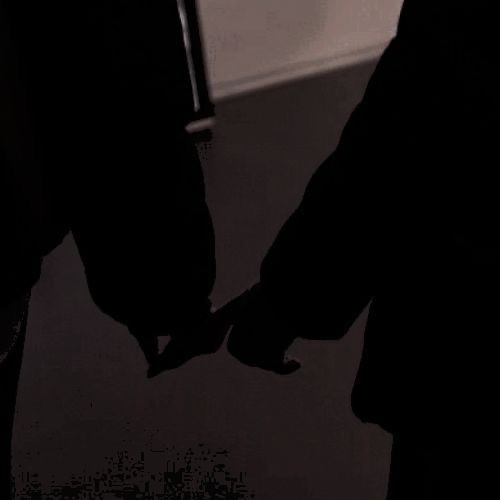

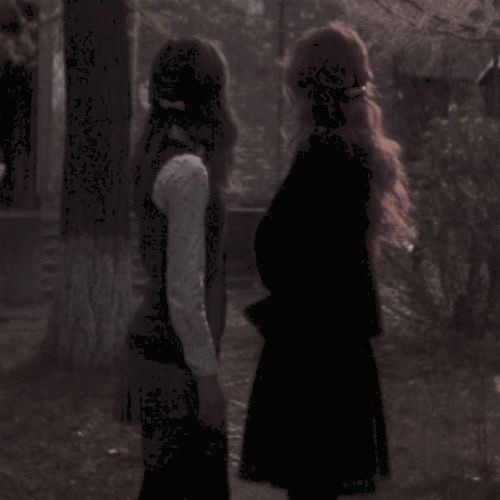
Synopsis: In the halls of Daewon High School, you academic rivalry, born of contrasting styles, laid the groundwork for an unexpected connection. A tale of competition, shared recognition, and evolving relationship.
A/n: Academic Rivalry,some playful banter,Bada being kind,is a bit rushed
Word Count:3.9k

The story of the academic rivalry between you and Bada could be traced back to the halls of Daewon High School, a prestigious institution in the bustling heart of Seoul. Both of you were prodigies in your own right, emerging as academic stars in a sea of bright minds. The competitive spirit that simmered beneath the surface of your scholarly pursuits had its roots in the early days of your high school journey.
As freshmen, you and Bada were already making waves with your exceptional performances. The teachers couldn't help but marvel at the intellectual prowess displayed by two students who seemed destined for greatness.
Your backstory was one of humble beginnings. Born into a middle-class family, you had always viewed education as the key to transcending societal limitations. The determination to succeed and prove your worth had been instilled in you by your parents, who worked tirelessly to provide you with the opportunities they never had.
Bada, on the other hand, hailed from a family with a long lineage of scholars and intellectuals. The pressure to uphold the family legacy weighed heavily on her shoulders. Her parents, both accomplished academics, had set a high bar for success, and Bada was determined to not only meet but exceed those expectations.
The first encounter that set the stage for your academic rivalry occurred in the freshman year English class. The teacher, recognizing the exceptional talent in both of you, assigned a collaborative project that would serve as a precursor to the competition that would unfold over the years.
As fate would have it, you and Bada were paired together for the project. Initially, it seemed like a harmonious partnership, with the shared goal of producing a stellar presentation. However, as the days progressed, the differences in your approaches became apparent.
You, driven by a passion for the subject and a desire to delve deep into the material, took a creative and holistic approach to the project. Bada, with her meticulous and analytical mindset, preferred a structured and methodical strategy. The clash of these contrasting methodologies resulted in a project that was neither a seamless fusion of ideas nor a harmonious collaboration.
When the teacher evaluated the project, the feedback was mixed. The creativity and depth of your insights were praised, but the lack of structure and organization drew criticism. Bada, on the other hand, received commendation for the precision and clarity of her contributions but was urged to consider incorporating a more creative element.
The experience left both of you with a sense of dissatisfaction. For you, it was the first taste of a less-than-perfect performance, while for Bada, it was an unaccustomed brush with constructive criticism. The dynamic had shifted, and an unspoken challenge lingered in the air.
The following years witnessed an escalation of the rivalry. Each exam, project, or presentation became a battleground where you and Bada sought not just to excel but to outshine each other. The competition fueled an unrelenting pursuit of excellence that saw both of you consistently topping the class.
In the crucible of academic fervor, the rivalry extended beyond the classroom. Extracurricular activities, leadership positions, and even accolades from teachers became markers of success to be fiercely contested. The once-harmonious atmosphere of Daewon High School now crackled with the electric energy of a rivalry that had transcended the ordinary.
The competitive spirit, while driving you and Bada to extraordinary heights, also exacted a toll on your personal lives. Friendships were strained as the pursuit of academic superiority overshadowed other aspects of high school life. The unspoken tension in the hallways, the pointed glances exchanged during class discussions, and the occasional clashes in student council meetings became defining features of your high school experience.
The teachers, observing the intensity of the rivalry, attempted to channel it into positive avenues. You and Bada were often chosen to represent the school in academic competitions, debates, and quiz bowls. While these opportunities provided a platform to showcase your talents on a broader stage, they also heightened the stakes of the rivalry.
Despite the competitive undercurrent, there were moments of shared recognition. The mutual acknowledgment of each other's brilliance, even if begrudgingly given, fostered a strange camaraderie. You both knew that the rivalry, while fierce, was also a source of mutual growth and intellectual stimulation.
"You did well in the debate today," you acknowledged, unable to completely conceal the admiration in your voice.
Bada responded with a slight nod. "Your points were impressive too. It's always a challenge keeping up with your unpredictability."
The recognition, however, did little to assuage the burning desire for supremacy. The rivalry continued to drive both of you to push the boundaries of academic achievement.
The banter and debates during those high school years had a different flavor. In the classrooms of Daewon High School, where the echoes of spirited discussions reverberated, the story of you and Bada unfolded amidst playful taunts and competitive banter.
"Looks like you narrowly escaped defeat in today's quiz," Bada teased, a mischievous glint in her eyes.
You shot back, "Narrowly? I call it strategic brilliance. Keeps you on your toes, doesn't it?"
The teachers, familiar with the dynamics between you two, often found themselves caught in the crossfire of banter.
"Ah, the intellectual sparring continues. I'm beginning to think I should assign you both to opposing debate teams," Mr. Kang, your history teacher, remarked with a chuckle.
Bada replied, "We'd welcome the challenge, wouldn't we? It might make things more interesting."
The banter extended beyond the academic realm. During student council meetings, where both of you held prominent positions, the discussions often took on a competitive edge.
"I propose we implement a mentorship program," you suggested, eyeing Bada with a challenge in your gaze.
Bada responded, "While mentorship is valuable, let's not forget the importance of independent learning. We don't want to coddle our fellow students."
The debates, while spirited, were always underlined by a mutual respect. The rivalry, though palpable, was a driving force that propelled both of you to strive for excellence.
Amidst the playful banter, there were moments of genuine collaboration. The fusion of your creative approach and Bada's analytical mindset occasionally resulted in projects that showcased the power of your combined intellects.
One such project, where you both collaborated on a research paper exploring the intersection of literature and science, garnered praise from your professors. The recognition, albeit shared, did little to quell the ongoing rivalry.
— — — — —
The hallways of Seoul National University echoed with the hurried footsteps of students rushing to their next classes. Among them were you and Bada, academic rivals whose competitive spirits fueled a perpetual race for excellence.
In the realm of academics, you and Bada were often neck-and-neck. Your prowess in the sciences matched her linguistic finesse, and each test became a battleground where victory was never guaranteed. The atmosphere between you two was always charged with unspoken competition, and your grades were the scoreboard that determined the winner.
Today was no different. The air buzzed with anticipation as the university prepared to release the results of the latest round of exams. The stakes were high, and both of you knew that this could be the moment that tilted the scales in one direction.
The backstory of this rivalry traced back to your first year at the university. Both you and Bada were standout students in your respective high schools, used to being at the top of your class. When you found yourselves in the same university, it was inevitable that your paths would cross.
The competition began innocently enough, with friendly banter and subtle attempts to outshine each other. However, as the semesters progressed, the rivalry intensified. Your accomplishments became the measuring stick for Bada, and vice versa. The stakes were not just about grades; they were about asserting dominance and proving who was truly the best.
As you entered the lecture hall where the test results were to be announced, a knot of nerves twisted in your stomach. The room was abuzz with whispers, and the tension was palpable. Bada, with her customary stoic expression, sat a few seats away from you. The unspoken challenge hung in the air like an electric current.
The professor walked in, holding a stack of graded papers. The room fell into a hushed silence as he prepared to distribute the tests. The moment of truth had arrived.
One by one, the professor called out names and handed back the exams. The tension in the room escalated with each passing moment. As your name was called, you reached out to grab your test, trying to hide the tremble in your hands. You quickly scanned the pages, relief washing over you as you saw the coveted "100%" at the top.
A triumphant smile crept across your face as you turned to glance at Bada. "What did you get?" you asked curiously, a mix of excitement and anticipation in your voice.
Bada's expression remained impassive as she received her test. She glanced at the pages and replied, "99%," her tone cold and unaffected.
A surge of exhilaration coursed through your veins. For the first time, it seemed victory was firmly in your grasp. "Well, looks like I finally got the upper hand this time," you said, unable to conceal the wide grin that spread across your face.
Bada met your gaze with a steady look, her poker face betraying no emotion. "Congratulations," she replied simply, her voice devoid of any hint of rivalry.
You couldn't resist the urge to boast. "I guess I've broken the cycle. Maybe this is the beginning of a winning streak," you declared, reveling in the momentary triumph.
As the news of your perfect score spread through the lecture hall, whispers of congratulations and admiration filled the air. Friends patted you on the back, and the sense of accomplishment lifted your spirits.
However little did you know the true nature of Bada's response. While she maintained her cool facade, there was a subtle glint of satisfaction in her eyes. What you didn't realize was that she had intentionally missed one question, not out of negligence, but as a calculated move. Bada had liked you for a long time, and this small act was her way of creating a moment of joy for you.
As you continued to bask in the glory of your achievement, Bada sat there, seemingly indifferent to the numbers on her paper. In reality, her heart carried a secret that she had guarded for far too long. The satisfaction in her eyes was not just about letting you win this round; it was about creating a moment that would make you smile, blissfully unaware of her feelings.
The rivalry between you and Bada had always been more than academics. Beneath the competitive banter and shared challenges, a connection had quietly blossomed. Bada had admired you for your dedication, your passion, and the genuine kindness that you extended to everyone around you. It wasn't just about being the best academically; it was about being the kind of person that made her heart skip a beat.
The backstory to this unexpected gesture traced back to a moment of vulnerability. Bada, with her sharp intellect and disciplined approach to academics, had always been perceived as an unyielding force. However, beneath the exterior of stoicism lay a desire for connection and understanding.
One day, as you were preparing for a particularly challenging exam, Bada caught a glimpse of the stress that clouded your usually confident demeanor. Instead of seizing the opportunity to press her advantage, she recognized the humanity in your struggle. It was then that she made a silent pact with herself – to occasionally let you taste the sweetness of victory, even if it meant deliberately missing a question.
In the weeks that followed, as you continued to revel in your newfound success, Bada observed from the sidelines. She saw how your confidence blossomed, how the taste of victory spurred you to even greater heights. And in those moments, she found a peculiar satisfaction – the satisfaction of seeing you smile, even if it was at the cost of a single percentage point.
The days turned into weeks, and the routine of academic rivalry persisted. However, an unspoken understanding had developed between you and Bada. She continued to be the formidable competitor, pushing you to excel, but every now and then, a subtle gesture hinted at a connection that transcended grades and competition.
In the midst of this dynamic, a friendship, unacknowledged and yet quietly thriving, began to take root. The rivalry that had once been fueled by a desire for supremacy now carried the weight of shared victories and unspoken gestures of camaraderie.
As the semester progressed, the academic challenges continued, but the relationship between you and Bada took on a new dimension. The hallways that were once silent witnesses to whispered rivalries now echoed with the occasional laughter and shared insights.
The library, with its hushed whispers and the scent of old books, became an unlikely setting for the next chapter in your evolving connection with Bada. As you both immersed yourselves in your studies, the atmosphere was charged with an unspoken camaraderie that had gradually replaced the intense rivalry of your earlier encounters.
One day, as you were engrossed in your textbooks and notes, Bada looked up from her own stack of books. "Do you want to grab a coffee after this?" she asked, her tone casual but carrying a warmth that transcended the usual competitiveness.
The invitation caught you by surprise, but the genuine sincerity in her eyes made it impossible to decline. "Sure, I'd love that," you replied, offering a genuine smile and a light blush. The idea of sharing a coffee, something that had started as a casual outing, had now become a symbol of the connection you were building.
As you both ventured into the campus café, the familiar aroma of coffee beans enveloped you. The atmosphere was light, free from the usual undercurrents of rivalry that had defined your interactions. The conversation flowed effortlessly, weaving through topics beyond the confines of academia.
"I never knew you were into literature," you remarked, genuinely intrigued by this new side of Bada.
She chuckled, her eyes lighting up with enthusiasm. "Yeah, I've always loved getting lost in a good book. There's something magical about the way words can transport you to different worlds."
The exchange of personal interests continued, revealing shared passions for travel and a mutual appreciation for the intricacies of the Korean language. The coffee outings became a regular occurrence, each one peeling away another layer of the barriers that had once defined your relationship.
As weeks turned into months, the initial wariness between you and Bada melted away, paving the way for a genuine connection. The unspoken pact, where occasional victories were traded for moments of acknowledgment, remained intact.
One afternoon, as you sat in your usual corner of the café, sipping coffee and sharing laughs, Bada seemed a bit more reserved than usual. The air carried a subtle tension, and you couldn't help but notice the thoughtful glances she occasionally directed your way.
"You seem a bit quiet today," you observed, your tone gentle. "Everything okay?"
Bada took a deep breath, as if gathering her courage. "Yeah, everything's fine. Actually, there's something I've been wanting to talk to you about."
The shift in her demeanor caught your attention. "Sure, go ahead. We're friends, right?"
A hint of relief but quick sadness flickered in Bada's eyes. "Yeah, friends," she affirmed, her gaze meeting yours. "I wanted to say... I that I really love our time together, and I don't want to mess it up, but I need to be honest with you."
Curiosity tinged with a touch of concern filled your expression. "Of course, Bada. You can be honest with me."
Taking another deep breath, she confessed, "I've liked you for a long time now. More than just as a study partner or a friend. I wasn't sure if I should say anything, but I didn't want to keep it from you."
Surprise registered on your face as you absorbed her words. Bada, the once stoic academic rival, had just revealed a vulnerability that spoke volumes. The café, with its low hum of background chatter, seemed to quiet down as you processed her confession.
The pause lingered for a moment, tension hanging in the air. Then, unexpectedly, you found yourself smiling. "Bada, I appreciate your honesty. I didn't see this coming, but I have to admit, I've liked you too."
Her eyes widened in genuine surprise. "You do?"
"Yeah," you chuckled, the weight of the unspoken tension lifting. "I guess our connection goes beyond just acing exams and grabbing coffee. I like you, Bada, more than I thought."
Relief washed over her, and a genuine smile graced her lips. "I was worried I might mess things up between us."
You reached across the table, gently taking her hand. "Bada, our connection is stronger than that. I'm glad you told me. Let's see where this takes us, without the pressures of academic rivalry."
From that moment, the dynamics of your relationship with Bada shifted once again. The coffee outings, once symbols of friendly competition, now became a canvas for the blossoming romance. The barriers had crumbled, revealing a connection that transcended the expectations of academia.
As the days turned into nights, you and Bada navigated this new chapter with a shared understanding. The unspoken pact, built on the foundation of occasional victories and heartfelt acknowledgments, had paved the way for a love story that had quietly unfolded beneath the surface of academic competition.
— — — — — —
The test results, once a source of tension, became a mere formality in the journey of your academic and personal growth. The rivalry that had once defined your interactions now stood as a testament to the transformative power of unexpected connections.
One day, as you and Bada sat in the same lecture hall where the initial rivalry had taken root, the professor announced another round of test results. The atmosphere, once thick with tension, now held an air of camaraderie.
As the professor called out names and distributed the exams, you and Bada exchanged knowing glances. The competitive spirit remained, but it was no longer fueled by a desire for supremacy. It was a shared journey of growth, each victory and defeat a stepping stone in the evolution of your friendship.
When you received your test, you scanned the pages, your heart pounding with anticipation. The familiar "100%" greeted you, and you couldn't help but smile. Turning to Bada, you asked, "What did you get?" Curiosity and genuine interest colored your words.
Bada, maintaining her composed demeanor, replied, "99%," with a hint of a smile playing on her lips.
The realization hit you – this was not a defeat but a continuation of the unspoken pact. You smiled widely, not as a display of triumph, but as an acknowledgment of the shared journey you and Bada had undertaken.
"I guess we're maintaining the balance," you said, your voice filled with a newfound understanding.
Bada nodded, the glint of satisfaction in her eyes mirroring your own. The professor, unaware of the intricacies of your connection, continued with the announcements, and the hall filled with a sense of collective achievement.
As you and Bada walked out of the lecture hall, the sun casting a warm glow over the campus, the unspoken pact between you two lingered in the air. The rivalry had evolved into a friendship, a connection that defied the expectations of competitiveness.
In the heart of Seoul National University, where the halls echoed with the pursuit of knowledge, the story of you and Bada became a testament to the transformative power of unexpected connections. The rivalry that once fueled the academic landscape now stood as a symbol of growth, shared victories, and the enduring bonds that emerged from the unlikeliest of beginnings.
Now, with the acknowledgment of your mutual feelings, the dynamics between you and Bada shifted once again. The coffee outings, once symbols of friendly competition, now became a canvas for the blossoming romance. The barriers had crumbled, revealing a connection that transcended the expectations of academia.
As the days turned into nights, you and Bada navigated this new chapter with a shared understanding. The unspoken pact, built on the foundation of occasional victories and heartfelt acknowledgments, had paved the way for a love story that had quietly unfolded beneath the surface of academic competition.
The exchange of glances had become laden with unspoken meanings, and every shared moment held a layer of intimacy that went beyond friendship. The sunsets over the campus felt warmer, and the laughter shared in the cafés echoed with the resonance of newfound affection.
One evening, as you both strolled through the campus, Bada couldn't resist a playful jab at your once intense rivalry. "Remember when you used to boast about being the smartest one in class?" she teased, nudging you lightly.
You chuckled, playing along. "Ah, those were the days when I had to remind you who the real brainiac was."
Bada raised an eyebrow, her eyes glinting with mischief. "Brainiac? Please, I seem to recall someone struggling to keep up with my brilliance."
You feigned offense, a playful glint in your eyes. "Oh, please. Your brilliance couldn't even match my wit."
The banter continued, each remark carrying the weight of shared history and a newfound camaraderie. As you both reached a quiet spot under a tree, the playfulness took a surprising turn. Bada, with a mischievous glint in her eyes, suddenly lunged at you, causing you to stumble backward.
Laughter echoed through the campus as Bada pinned you down playfully, her eyes sparkling with a mixture of challenge and affection. "Who's the brainiac now?" she teased, a playful grin on her face.
You couldn't help but grin back, the rush of the unexpected moment adding a layer of excitement to the playful banter. "Alright, you got me this time. But let's see who emerges victorious in our next academic duel."
Bada leaned in, her breath mingling with yours. "Oh, I'm looking forward to it. But for now, let's enjoy this little victory, shall we?"
As the playful banter lingered under the shade of the tree, Bada's eyes held a warmth that transcended the teasing. The laughter, the shared history, and the unexpected twists in your connection had brought you both to this moment.
Bada, still playfully pinning you down, leaned in with a gentle smile. "You know," she whispered, "sometimes the best victories are the ones we least expect."
A grin played on your lips as you replied, "I couldn't agree more."
In that suspended moment, the air between you and Bada crackled with anticipation. The playful rivalry had seamlessly transformed into a shared understanding, and the lines between competition and connection had blurred.
Without another word, Bada closed the distance, and your lips met in a tender kiss. The world around you seemed to fade, leaving only the soft rustle of leaves and the warmth of the embrace. The kiss, a culmination of unspoken feelings and the journey from rivals to something more, spoke volumes.
When you finally pulled away, a shared smile lingered between you. The playful banter, the academic duels, and the unexpected connection had led you to this moment, where the heartbeats echoed a new chapter in your evolving story.
In the heart of Seoul National University, where academic excellence met the uncharted territories of playful romance, the story of you and Bada continued to unfold. The once fierce academic rivals had discovered a bond that went beyond the confines of competition, and every banter-filled moment added a layer to the narrative of your evolving connection.
#bada lee x reader#swf2#swf2 x reader#bada lee#street woman fighter 2#bebe#bada lee fanfic#bada lee x oc#bada lee x y/n#bada x reader#bada lee imagine#lee bada#academic rivals
116 notes
·
View notes
Text
Examining Tim Han LMA Course Reviews for Transformative Personal Development
Tim Han���s Life Mastery Achievers (LMA) Course has attracted a lot of attention due to its revolutionary effects on people who want to advance both personally and professionally. In this thorough analysis, we examine the Tim Han LMA Course Reviews and examine how it enables learners to navigate their path to success successfully.

Techniques for Self-Control: The Foundation for Personal Growth
LMA Course is centered on a strong framework for developing self-discipline. This fundamental component is essential for people who want to reach their greatest potential. Han stresses the significance of exploring one’s psychology further in order to uncover latent traits and talents rather than only making superficial changes.
The idea of changing one’s identity is among Han’s most notable recommendations. This entails developing a fresh perspective of one that acts as an engine for achievement and constructive action. People can instill a sense of purpose and determination that are necessary for ongoing growth by changing the way they see themselves.
Han also presents the idea of enforcing severe consequences for breaking promises. This strategy provides a powerful incentive to uphold responsibility and discipline. People are driven to stay on course and pursue their goals with unshakable determination when there are repercussions associated with their behavior.
Changing Who You Are: Accepting Change for Personal Development
In order to evolve personally, Tim Han LMA Course pushes students to rethink who they are and welcome change. People are challenged to let go of limiting beliefs and embrace their actual potential through a series of immersive exercises and introspective reflections.
He stresses the need to embrace a growth mindset that promotes resilience in the face of adversity and ongoing improvement. Through adopting a new outlook and welcoming modifications, individuals can surmount challenges and access novel prospects for accomplishment.
Han also promotes the development of a good self-image that is consistent with one’s objectives and desires. Participants might use self-affirmation to drive themselves towards their goals by visualizing themselves as competent and accomplished people.
Success Insider: A Comprehensive Strategy for Individual Wealth
The thorough approach to personal prosperity used by Tim Han’s LMA Course is highlighted in Success Insider’s assessment. Tim Han Life Mastery Achievers (LMA) Course Review provides a wealth of knowledge covering many facets of life, including goal-setting, attitude development, habit-building, and personal growth, in addition to self-discipline strategies.
Participants receive access to a game-changing success blueprint by combining Tim Han’s tried-and-true techniques for building self-discipline with insights from Success Insider. This collaborative approach gives people the skills and mindset they need to prosper in today’s changing world.
In conclusion
Tim Han LMA Course provides a comprehensive framework for success and personal growth. Through the application of self-control strategies, adaptability to change and integration of Success Insider insights, individuals can set out on a transforming path to reaching their maximum potential.
The Life Mastery Achievers (LMA) Course is a ray of hope for people who want to reach their greatest potential. The course provides a thorough road map for success by emphasizing self-discipline strategies, identity transformations, and holistic approaches to personal prosperity. Through the integration of Success Insider insights and his tried-and-true methodology, participants get the skills and perspective needed to traverse the path towards both personal and professional fulfillment successfully.
People who go on this life-changing adventure are given the ability to accept change, get past setbacks, and fulfill their dreams, which eventually leads to an unmatched success in life.
Source Credit:
https://timhanlmacoursereviews.medium.com/examining-tim-han-lma-course-reviews-for-transformative-personal-development-56a6a172a1f3
#entrepreneur#founder#marketing#startup#Life Mastery Achievers#LMA Course#Tim Han#LMA Course Reviews#Personal Development#Tim Han LMA Course Reviews
58 notes
·
View notes
Text
circle, line
A circle and a line look different, right?

What about now?
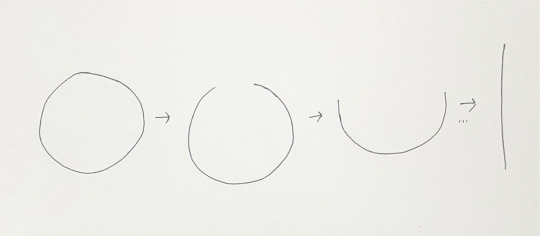
Time in gintama is a useless subject. Unfortunately, it is also a prerequisite to the gintama-human ontology. Thus, with a heavy heart, I look at lines, loops, and other unlikely time-mechanics in order to construct a gintama time for the gintama-human.
Throughout this pseudoscientific inquiry, I locate gintama time– which I eventually call [time], for lack of better notation– in my thematic abuse of two mathematical concepts: irrationality and uncountable infinity. To give away the end, [time] is an uncountable infinity born in irrationality. Which, even to its own creator, makes little sense.
Finally, this is my defense of the gintama time loop. Why? Well, I like loops and loop-like things, and, after all, we want good things to last, to repeat. So this turns out to be a love letter to algebraic topology. Sorry time loop fiction.
Onto more interesting things.
preliminary time notes
To think about time in gintama, I bracket [real world time] from [the narrative structure of gintama, which follows a time] and [time as characters in gintama experience it, i.e. personal time]. The latter two time-categories reflect [real world time] because gintama is written by an author, who, by virtue of existing, lives in [real world time]. That is, while narrative is fun because you can play with reality to make something new (e.g., time loop, time travel, non-chronological narratives in general), creation still requires building blocks, which are ultimately some sort of known assumption, that inevitably require some understanding of actual Time.
All this to say I look at [narrative time] and [personal time] through philosophies about [real world time], which themselves are not especially real; in other words, my methodology is kind of shit.
the situation– personal time
Otae announces the whole of gintama in chapter one.
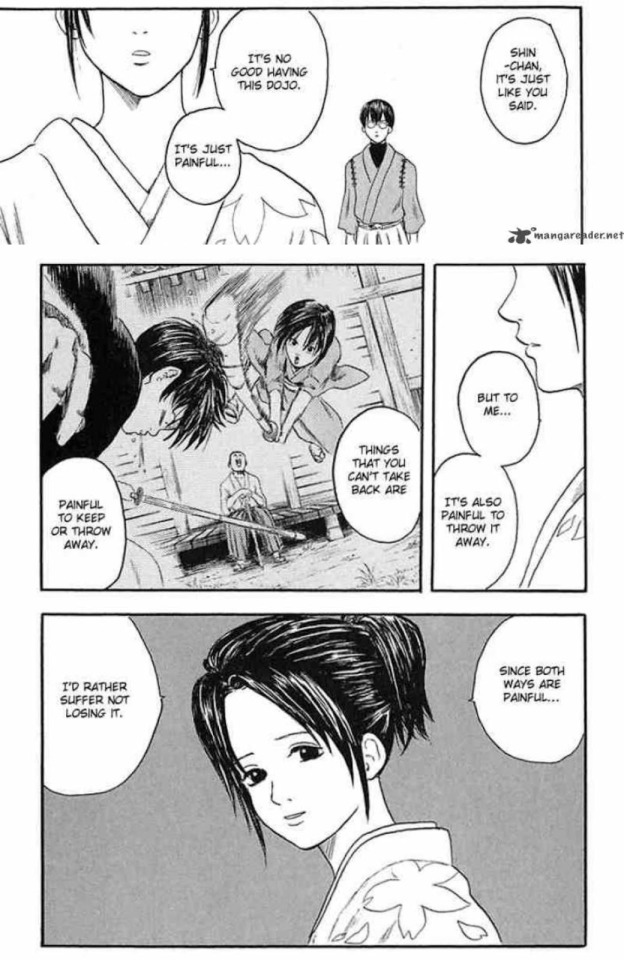
This is gintama’s genetic code.
To speak of time here is to note a few things:
1. amanto possess advanced technology;
2. humans are forced to throw away their physical swords;
3. the sword of the soul.
The sword is a tool*; later chapters tell us that it “carries the soul”. So the sword represents, or, rather, is, something irreplaceable to humanity, that relates to the soul and personhood. This much is corroborated by the plot cycle.
With contrast to the sword, time appears impersonal. We conceive of time, at least scientifically, as the movement between past to present, present to future, stretching infinitely before and after, where our existence does not matter to its flow.
But would “time” exist without anyone to observe it?
Alternatively, how can “time” be experienced as time– as a movement– without anything to measure it?
The human must “create” “time”, if only because it would not be “time” without a person to observe and call it as such. What this person perceives, they conceptualize as movement (measurement); and thus there must be a prior position to reference, or, in the least, a default– a memory.
So “time” requires the present to be given by a prior; that is, for “time” to be experienced, the human who observes it needs already given into a past. The past itself (“knowledge” of the histories that make us who we are, “knowledge” of the tools that allow us to intend various things)– i.e., its inherent “given-ness” to us– depends upon it outliving those who live it. Thus various contexts, with their technologies, arts, and writing (though these are not really separable), function also to contain the essential past-as-memory for those who use and engage with them.
Alright, great, but what does this have to do with the dick-and-balls manga? Nothing, really, except for everything. The amanto (with futuristic technology, in futuristic contexts**) force humans to give up their swords. It would be ridiculous to talk about what the “sword” means here. Suffice to say that it carries (an assumed) cultural-historical weight, an (idealized) memory. We would expect that its dispossession disrupts temporality. And it does– hence the “time loop”.
People love to talk about cyclical time in gintama. It is the same situations, over and over again; that no one ages, injuries heal by the next chapter, and, more than serial-typical regressions, that there is a sense that things won’t work, that important change won’t last, that life “just gets worse and worse”. Time as lasting change– or what we like to call “linear time”– doesn’t feel like it exists.
To return to chapter one. Here the central conflict is not actually between amanto and human; it is between Shinpachi and Otae. Their dying father tells them that even if they give up their physical swords (memory, past), they are not to lose the sword in their soul (?unknown). Sword-less Shinpachi resents him. Rather than “cling to the past”, he tries to adapt to the “linear time” of the amanto: he works in modern food service, gives up on the dojo, and, most importantly, opposes Otae.
What does Otae do? We might expect her to inverse Shinpachi, that is, to “embrace” cyclicality, which would be to give up. She doesn’t. Otae tries to adjust, to make a living and survive, but, unlike her brother, she does so also to protect the “thing she can never take back”. This, as Shinpachi points out, is ridiculous, unrealistic, and makes no sense. And yet it is Otae who is thematically vindicated in the end.
From the first chapter, then, we can construct a sense of [personal time (to the characters)]. Again, for change to exist, there must be a prior form; that is, a certain sort of time is what makes change (technological, political, situational advancement) possible. Further, the self is involved in the process of time. Thus when the self is not whole (lacks the sword), time, and thereby change, becomes cyclical. So “time”, to the amanto, advances, because they can work with their external “selves” (technology, worlds, knowledge-memory) to “make change”. But time, to humanity, loops back on itself, is stopped, because humanity is bereft of its self and can only return to the starting point.
We notice that humans still live in a world where time progresses– where time goes on without them. There is a split between the time of the self and the time of the world. Shinpachi decides to do away with memory and join the world-time, the “linear time”, that is, the time of futuristic technology and change; but his sister, who goes along with this and drags the past with her, does much better.
For a more thorough application of this thought, please rewatch the monkey hunter arc.
*It is also (obviously) a dick.
**This reveals some connection between the concepts of “tool”, “context”, and time. Though I say so inverse-facetiously, since nothing about gintama can be taken as if it were serious.
time loop– narrative time
So what about infinity?
Personal time is not infinity. In a first sense, it simply is not infinite– characters die. In a second sense, even considering that memory can be (haphazardly) preserved beyond a lifetime, especially in a story, humanity as a whole is finite– there comes a point, eventually, where no one is left to do the remembering. And in a third sense, personal time is still a string of pasts that were once presents, into futures that will be presents; though this finite string might divide into an infinite number of presents, its divisibility renders it still essentially patterned, which is to say that it is not really “infinity”– it is still mathematically countable.
I mentioned a dysfunction of personal time into cyclical (“un-change-able”) personal time. This is associated with sword-less-ness, equivalently memory-loss, equivalently not being a whole self. The fun of stories is that “character” can be projected into the structure of the story itself; it would make sense for cyclical personal time to have some correspondence to, or at least effect on, narrative time, that is, narrative structure.
At this point I should be more general about the time loop.
The time loop is thought to stand opposed to “linear time” in the stagnation-change, lack-presence, circle(hole)-line([censored]) dichotomy. Specifically, the time loop is opposed to “linear time” in the sense that nothing (usually) changes in a time loop. Or, more exactly, change is slow, nothing gets “better” in any real sense. Again, only where time flows “linearly" can we build off of what is prior, can we intend and achieve a future, can we change for the better (or so we assume). Thus the time loop carries a sort of moral condemnation in its very structure— a karmic debt, if you will.
Characters in plots get thrown into time loops because something has gone wrong. Whether or not they are the direct cause, the character must “figure something out”, “learn a lesson”, that is, address the problem that created the time loop, which will almost always be related to a step within the story of their self-development, in order to escape it. The point of the story is to escape it. This is just how stories go.
Then the gintama narrative “time loop” is barely a time loop. It repeats itself, sure, and no one ages, but that’s because no one should age in a wsj serial and sorachi tried to be funny about it. Still, some lingering sense of futility, or maybe just the sheer repetition of the same event for 16 years of serialization, weighs on anyone who reads it. This kind of feels like time loop fiction; there should be a point to the plot cycles. What are they trying to force Gintoki to do, to show us in his character? What are they aiming for, what is driving the “time loop” in the first place?
Takasugi is driving the time loop.
(More specifically, Takasugi’s crushed eye-ball (soul), his eyelid; inaccessible past (memory), is driving the time loop.)
Another clarification. Personal time is time as experienced by the person; it is pure interiority. Thus, while the world moves on– personal time is time as movement– the person may not.
For the person to move on, they must be able to make change, that is, from a prior form, give birth to the next form. This is because only the person can observe, know, and experience “time”, which itself is a movement (a change in position) from past to present, present to future, that is defined by the person. So change and time-as-movement, within personal time, look synonymous.
Further, movement in personal time requires the given past– the memory, from before me, passed down to me by people and places and things and contexts that I outlive– to be held by me, to be part of the “I”, and thus for my bodily self and my non-embodied self to generate personal time together. In gintama, I locate “memory” as the sword. But gintama’s sword is also part of the Self; so personal time in which the Self can move is only born out of a whole self. Equivalently, personal time is not the Self, but it is intimately related to a change that can only be wrought by the Self, which is to say, both my body and my given memory are necessary to the movement of personal time.
In any case, “gin-tama” is about Gin-toki, and, quite literally, his soul, so we would suspect that narrative time is a projection of Gintoki’s personal time. But narrative time cycles weirdly, and Gintoki still has his sword. Alternatively: if Gintoki was not already a Self, that is, if he had to learn some lesson to become a Self through the time loop, how could he have saved any of the endless roster of villains that conveyor-belts around him? So maybe Gintoki holds his sword without remembering– except that he doesn’t, and the story makes this clear (“I haven’t lost a single thing”). He does, however, seem to possess a slightly different personal time. He and his sword remind antagonists of what they’ve forgotten, and these antagonists sometimes move forward with him into the next cycle. In other words, there is some sort of movement, a change, in the narrative, in the structure, associated with each loop.
But cycles stay cycles, up to a very particular moment.
At which point I revert to the most obvious advantage of narrative time: it interacts with the readers. Gintoki “is” a Self (in the sense that an electron is both a wave and a particle), who carries his sword, who remembers, who hasn’t lost a single thing. Yet the time around him repeats the same events, over and over again. Why? Well, in part for the above: every gintama villain needs to learn the same lesson. But every gintama villain is also Gintoki, and even if he remembers, we don’t. To risk being redundant, we, as readers, have no idea what actually happened to him until chapter 519, when it is fished (unwillingly, I think) out of Takasugi’s eyelid.
Then narrative time functions in several senses. It relates to Gintoki’s personal time, but indirectly; more generally it looks like a projection of the Losers’ personal times, where a Loser is one who has lost their sword. Still every Loser is also Gintoki, and every lost sword is lost memory, and even if Gintoki hasn’t forgotten anything– and even if Gintoki carries his past, his sword, with him– we, the readers, don’t. Surely enough, historical time in gintama only begins after chapter 519. The revelation must precede it.
So the gintama time loop is driven forward by whatever it takes for this memory to be revealed. Each iteration brings us closer, but there is no lesson for Gintoki to learn that would speed this up; the heart of it is that he is waiting, he has to wait, for memory to return, for his past to come back to him, and this past is exactly Takasugi.
Why? Takasugi is the past (his eye, his eyelid, is the past); his eye is therefore Gintoki’s sword, the sword of the soul we need for time to move on. But 10 years jump before Takasugi can make the approach, and even then only from behind. Worse, it takes hundreds more chapters for him to work up the resolve to face Gintoki head on. So if Gintoki somehow constrains the world to cyclical time, equally so does Takasugi.
In short, narrative time cannot move until Takasugi’s eye becomes Gintoki’s sword. Thus half of the loop is about Gintoki always standing up again, always waiting for Takasugi to face him, and the other half of the loop, that is, its motivation, is about Takasugi working up the guts, or whatever he does throughout the series, to finally come at Gintoki* face to face. Yes, I’m equating circles and lines, which is silly. But I did this in the beginning anyways. Rewatch the final.
So why does this matter? Readers well-versed in gintama sword theo-ontology may recognize that the sword which is memory is identical to the sword of the human. This is partly because I’ve defined personal time to require the whole Self (the human) to move, which itself requires both the sword-as-memory and its human wielder. It is also because I’ve equated Takasugi to memory instead of treating him like a character (sorry Takasugi). Nevertheless, creation of the human sword (the memory-sword) is now essential to creating time, and creating time is now equivalent to completing the Self, that is, to becoming “human”. Put another way, Shouyou isn’t killed until Gintoki kills him in 519.
More specifically, Gintoki killing Shouyou undoubtedly completes (undoes) his humanity**. It is also the only way for anyone in gintama to have a future, because it creates, gives birth, to time, the time of the series. Further, its revelation births time in the present just as its actuality births time in the past: the Gintoki who swings his human sword, who cries, in Takasugi’s eye, is the one who swings it at him now. Gintama doesn’t actually timeskip until Gintoki kills Utsuro in silver soul.
Then the movement of time, both personal and narrative, requires three things:
1. a memory-sword (the human sword) (the sword of the soul);
2. a human to wield it;
3. and a decision on how to swing
I have discussed one and two to exhaustion. Now we turn to three.
*Gintoki is always Takasugi, in every case. The inverse holds as well.
**It also completes Shouyou’s, but that is for later.
in defense of the time loop
Birthing time looks like an escape from the time loop.
This is where the division between time, self, and change becomes essential. Why does the time loop, in many treatments, depress its readers? For the same reason that any tragedy is depressing: fate, un-change-ability, specifically, un-change-ability of things we want to change.
The time loop is a “literalization” of tragedy. The person trapped in the time loop, at best, loses the ability to determine their future, accomplish their projects, do what they want and have it last, that is, to find lasting (exterior) meaning (this is all exterior). At worst, this person carries their incapacity into a loop that is the same tragedy, over and over again, which they are helpless to prevent or change in any way.
This setup is not exclusive to the time loop– other variations could be immortality, reincarnation, oracles, endless linear eternity, et cetera. In every instance, though, the tragedy is that people cannot change the things that matter. And while the time loop usually removes external change to provoke internal change in its protagonist, gintama characters also struggle with the impossibility of changing themselves.
More generally, though, real time isn’t actually cyclical or linear. We move through time, changing form, towards our death– and so the common thought of time is “linear time”, which is really about “linear change” and an inability to “go back”. But time is only known to us, only countable, because of its cyclicality. There are 60 seconds to a minute; 60 minutes to an hour; 24 hours to the day; and then this repeats the next minute, the next hour, the next day; and then the next month, and then the next season, and then the next year; and then it repeats all over again. Time is only measurable, knowable, existent to us because it repeats. If it wasn’t known beforehand, how could we measure the present, the future, against it? And for it to be knowable, it has to be familiar; and for it to be familiar, we must have encountered it before; and here is the inherent repetition– we can’t stop the cyclicality or flow of time anymore than we can avoid our deaths. Real time makes possible our “change” just as it is unchangeable, just as its existence is conditioned on unchangeability.
Gintama is a story, and story time works differently than real time, so maybe in the story we can separate “linear time” (change-ability) from “cyclical time”, from “time loop” (un-change-ability). Even still, what happens after you escape a time loop? Equivalently, what happens after you escape the tragedy? In the usual time loop– at least the usual time loop in our minds– the loop is escaped into linear time, or, more appropriately, it is escaped into the time where linear change is possible. But why is “linear time” the happy ending? Even granted that it exists (which is questionable), what makes linearity better than repetition, that is, why do people love “linear change”?
The Joui 4 lived “linear time” during the war. They fought enemies, and won. They progressed towards something, and believed in it, too; they were the main characters of a power-scaling, battle-shounen manga. And yet, their linear time ended, or more accurately, was never “linear”. Shouyou’s death, if anything, only proved the inherent impossibility of their shounen dreams. So narrative time twists into defeatist cycles, and Takasugi is doomed forever to repeat, and this is probably more accurate to the condition of the actual world they inhabit, because, most importantly, time was always like this, linear change as linear time never existed.
But again, the tragedy was never about the time loop. From its inception, the tragedy has always been about intentionality versus ruination, “I” as capable actor versus “I” as acted upon, and the utter inability of anyone to change any of this. We want out of the time loop because we can’t do anything; we want out because we can’t act out of ourselves to make external change in any way that lasts. Ultimately, we want out of the time loop because we discover that our intentionality actually means jackshit. The world does what I don’t want it to, and traps me in this; I cannot act, and yet it acts on me. My despair at the exterior world which rivets me to itself quickly translates to despair in, at, my self. I can’t make change, so what does being [x person] matter, so this is my fault, so there’s no point in changing myself, so I can’t change myself in any way that matters, because even if I do everything right, there’s no meaningful effect on the world that holds me captive, et cetera. Thus everyone wants out of the tragedy, the time loop.
Including gintama villains, who usually try to get out of it by killing themselves. This never works.
The time loop is tragic because it makes its inhabitants absolutely passive to it and acts on them eternally. The gintama cast is supposedly full of “losers”; its villain of the week, while beating Gintoki, calls him a masterless dog, a ghost, the one who lost, along with the rest of the samurai, et cetera; and the loser here is inherently passive against a winning actor. Nevermind that Gintoki never fought for the Romantic Japan that lost to the amanto– his loss is even more infinite for the narrowness of its scope.
And yet, you’re not supposed to kill yourself.
Escaping the time loop– or, more generally, the tragedy– never guarantees linear time, because we always have to end the book on the happily ever after. So what really happens after you escape the time loop– is linear time actually a relief? Either things start going wrong, which isn’t the linear time ideal, or you achieve every dream, you make possible every impossibility, and come to the end of the infinite series by continuing on within it infinitely. Is that really “happy”?
Alternatively: the cycles of narrative time drive towards the birth of a new time. But the tragedy of the cycles is intentionality/ruination, and the cycles can’t be escaped into their “opposite”. Gintoki, a human, with a human sword, kills Shouyou, and thereby brought forth a new time. And yet, this new time was still cyclical.
Then what’s the solution– killing yourself? Takasugi, repetition Personified, asks this to Gintoki the entire series. Why won’t you stay down?, [Why are you crying?], [Why can’t I comfort you?], Why keep living in this world? Villainy aside, he does have a point– if you look carefully, living in the gintama world is incredibly, incredibly stupid.
Gintoki says: no matter how many times I fall, no matter how many times I fight the same fight over and over again, no matter if it never ends, I will always stand up.
This is the height of stupidity.
[time]
So narrative cycles aim at the revelation of Gintoki’s memory, which would identify sword with eye, tool with wielder, that is, complete the “human”, and thereby give birth to a new (non-linear) time.
Here we get to mathematical infinity.
Mathematical infinity is not a number, or even properly a concept. It’s more like a sign at the edge of a cliff that says, there’s a cliff here, here’s the end of the world– except that this sign also signifies whatever, and everything, that might lie beyond the cliff, which cannot really be called “essence”, or even be said to exist in the first place. In other words, infinity is a marker for a point of no return, that in of itself is nothing.
Some things are said to be “infinite”. Usually, these are patterns. A line is infinite, as is a parabola; but these infinities are predictable, that is, countable, because patterns are rules. Their comprehensibility allows us to treat them like fancy numbers.
Conversely, some functions decompose into situations that are entirely ungraspable. This edge of knowledge, where it devolves into paradox and nonsense, looks like uncountable infinity.
Uncountable infinity is the infinity whose name itself means nothing. It signifies to something that is, by axiom, impossible impossibility, ungraspable. When infinity “interacts” with the mathematical world– or, rather, when we push far enough to reach it– we come to paradox, chaos, and unintelligibility. Certainly, science could advance sufficiently to reconcile the mysteries of particle physics; but the fun of mathematical concepts is that you can define them in any way you like, even if they’re fake. And uncountable infinity is, by my definition, the “thing” that is always uncountable.
So gintama narrative cycles aim at something, while those in cyclical personal times suffer for them. Cycles, better, change-less-ness, correspond to sword-less-ness, to lack of memory, and historical time only “restarts” when Takasugi brings us the past. Et cetera, et cetera, et cetera.
This doesn’t mean our new time won’t be cyclical.
In the end, “time” is associated with sense of Self. This is an unavoidable relation, because time is a human word, in a human language, that describes what is ultimately only known to us as human experience. But “Self” is (itself) a problematic concept. After all, what determines one’s Self? Relatedly, who, and/or what, and/or where, and/or why, gets to possess Selves at all?
Within concepts of Self is often embedded an instinct towards differentiation. The (western philosophical) impulse is to originate this difference in agency: that is, through my free determination of my Will, my Projects, my Actions, and et cetera, I differentiate “I” from “other” and thereby constitute Me. Needless to say, concepts of “agency” are inextricably linked to “change”. Thus, in this particular conception, “time” is bound to “Self”, is bound to “agency”, is bound to “change”, and to invoke any one is to invoke the other three.
Here, “knowing” (as agency) finds itself imperiled. That is, though the “unknowable” would strip agents of acting-ability, “knowing” would also consign existence, life, the universe, et cetera, to determinism. In both cases, “(un)-knowledge” renders the agent passive. Thus someone might long for an unknowable magic in order to undo determinism, just as they might long for the knowledge to successfully determine their life; yet the one who longs for agency could find agency a disappointment, a not-agency. Equally, if the time loop embodies both desires before they collapse into paradox (I can continue into the unknown future if I escape; something is tying me down, my knowledge is insufficient to escape), “linear time” does so as well.
But now we return to infinity, to irrationality, to uncountability, in short, to paradox. The bulk of the previous 5000 words has been to determine that the dichotomy is false. To be straight, knowing and not knowing, agent and non-agent, the linear and the cyclical, are not separable from each other. Their binary is an illusion, and the suggestion of one carries within it the absence of the other; they are synonymous at the exact and every moment they are not. Clearly, this is not not-knowing, and not knowing, and not not-either of them at the same time. I call this uncountable infinity, the mathematically irrational.
The mathematically irrational is paradox. Consider: we can graph, and look at, certain functions, and yet never grasp their value (put x(sin(1/x)) into desmos). Similarly, we know exactly what “pi” is– the ratio of a circle’s circumference to its diameter– and we can define it, use it, find it in every instance. And yet, pi is an irrational number, because its decimals trail off into uncountable infinity. Knowing and not-knowing, united in the same action: irrationality is knowing in not-knowing, not-knowing in knowing, and also neither.
I will be ridiculous and find this paradox in gintama. I want to claim, in the first place, that the self never generated time at all; in the second, that this is never irreducible to agent/acted, knowing/unknown; and in the third, that time is generated by [time]. To do so, we must investigate the moment of its birth, in 519.
the cliff—519
Tools, given memory, etc., together with the persons who hold them, produce an actor-self, a time of possible change (a “linear” time). It is in 519 that Takasugi finally faces the camera.
Now Gintoki grasps the sword (memory, Takasugi). This should give us “linear” time.
But 519 is not so willing. Where we hope for capable agency, we find none. Instead linear/cyclical, active/passive, presence/distance, collapse into irrationality.
Take the archetypical moment. To Takasugi’s why, Gintoki says he’ll stand up. Specifically, he says, too bad– I (you) won’t fall.
Standing up is what Gintoki (a person, with a sword) does. It is how he defeats each suicidal villain, kills Shouyou, and kills Shouyou and Takasugi all over again. This is what the “time loop” would require of him.
Gintama antagonists, those paragons of rationality, tell us that it is irrational.
Otae is also irrational. Her irrationality doesn’t fix anything (⇔escape cyclical time, make change), and she knows so herself– “If I’ll suffer either way, I’d rather suffer protecting it.” 518 chapters later, Gintoki says: “I won’t fall until you [Takasugi] fall, until you stop, no matter how many times it takes, I’ll stand up again… even if I have to walk over my teacher’s corpse, even if I have to walk over your corpse, I’ll protect his disciple, our companion, Shoka Sonjuku’s Takasugi Shinsuke, his soul.”
So Gintoki stand(ing)s up until something– until Takasugi stops, until time is born– in order to protect Takasugi’s soul. This might look like an “end” to the cycle, but it doesn’t feel like one. “Even if I have to walk over your corpse”?
Alternatively, “saving” Takasugi should be the change that the cycles want to make, that would break them in any normal work of time loop fiction. It is “agency” (capable action, material change) at its purest. But Gintoki says he will stand up and kill Takasugi and stand up again. No matter how many times the same thing repeats, no matter if time never moves on, no matter if he is forced to kill the very person he’s trying to protect, Gintoki will stand up. How could Gintoki possibly care about escaping any cycle, when he is the one “perpetuating it”?
So gintama is not actually about escaping the time loop, which is the rational thing to do. Gintama is about, do you have the strength to keep living in the time loop, even if it never ends?, or, do you have the strength to kill your teacher and your friend, and lose everything all over again?, or, do you have the strength to eternally suffer for the thing that can never be taken back? In short: forget the capable actor– gintama is about being foolish, and irrational, and embracing the time loop by standing up.
If we look to chapter one, [standing up] is [protecting the thing that can’t be taken back]. Neither can be appropriately confined to cyclical or linear time. Otae says she’ll suffer either way, and Gintoki says he stands up to protect what Shouyou held precious, Takasugi’s soul.
Otae protects a thing that cannot be taken back. This is the past. Gintoki acts for– and this is also a protecting– the past. Takasugi is, in a literal sense, pierced by this past every moment of his life.
The past that we can recover, that we can fully integrate into ourselves, is the past that can be used to generate the future in “time”. Thus “accepting” the past “to move on” – accepting, making entirely part of oneself, making entirely interior – because only then can the past become knowable, comprehensible, and usable. The person must accept their past to change things, i.e., to make linear time. Time, change, and agency coincide.
Yet Otae’s past “cannot be taken back”. Certainly, even the accepted past cannot be “returned” to. But Otae’s past is the past that pierces Takasugi’s eye– that is, the past whose “revelation”, whose self-same existence, drives the completion/generation of gintama time itself.
So this is the past that “cannot be taken back”, in more than the literal sense. Takasugi is scandalized by its distance, even as he dies satisfied; Gintoki, ever-silent, still loses his composure at its provocation, is emptied by it, cries in 519 (in all of gintama), in 703. It is a past that refuses total use or incorporation; instead it acts on those who carry it, even after person is reconciled to sword (to its memory).
Its paradox in position. Though “the past” is always present (“I haven’t lost anything”, “how long will you keep looking at that crushed eye of yours”), it is simultaneously kept from us by an irreparable distance. Distance, of course, suggests space, which itself suggests a space that is surpassable. But this distance is not spatial– it is temporal. Gintoki carries the past, yet never reveals it to anyone, much less to us; in the end it is Takasugi who has to do the revealing, and even then only after 500 chapters. Further, its revelation actually increases the distance. We grow used to our proximity to Gintoki’s “point of view”, to our role, through him, as protagonist of the story; and here his defining moment is told not through his eyes, but through the eyes of the distant antagonist, whose breaking point is the discovery of the distance between him and Gintoki. Gintoki is reflected– more, revealed to have always been– across a distance that is unsurpassable.
This distance is equally time, because Takasugi and Gintoki were separated always, and only, by “the 10 years”. Takasugi comes to Edo– there is nothing stopping him, spatially, no physical restriction or meaningful law imposed, from making the approach– and yet he cannot make it. Or so we assume. We only know its universal separation axiom: 10 years, a distance between two points that could never be overcome or recuperated.
So the past is across an unsurpassable distance. In this sense, it cannot be taken back. It is simultaneously carried in, pierces, Takasugi’s eye, who struggles because he cannot reconcile it to himself. Just as it is always with him– “every time I look, the beast…”– it is also the one thing he cannot bear to see (your crying face). Though its revelation is necessary to New time, it is also what sent time into irregularity in the first place. And though it is irreparably distant, it pierces every moment of the present, which is to say: it degrades time, it makes things weird.
Its paradox in times. The cliff is pre-originary to everything by narrative position. Gintama narrative cycles press towards its revelation as first dilemma. It is before even the corpse field, before anything else. It drives each time Gintoki swings his sword and reenacts it. The very first moment that Shouyou finds Gintoki, is predated, predicated upon, generated, made possible by, the fact that Gintoki kills him with his sword.
From this past, Gintoki is (in the verb sense). It is ahead of him (in 519) and behind him (before 1). For its sake he “acts” towards a “change” (stands up) that he knows is impossible (“if I have to walk over even your corpse”*). In other words, for sake of this past, Gintoki lives as if he belongs to a “linear” time, even as he knows he doesn’t. The past brings forth itself again.
Finally, its paradox in agency. What is burned onto Takasugi’s eyelid is a single moment he cannot recover or recuperate. Instead, this moment acts on him, it pierces him, against his will. This sort of past is not an empty concept, that could be filled with any given circumstance. Takasugi is tortured because the content matters– because what happens on the cliff that day, matters.
The cliff is not what Takasugi, Gintoki, Shouyou, or anyone else, wanted. Worse, it is not what they fought for: Takasugi to save Shouyou, Gintoki to protect Shouyou’s disciples (in an act that he knows will destroy them), Shouyou to protect his children. Instead Takasugi is stripped of agency, and the eye that would acquire it; in the present he acts on everything because he is, in every moment, acted on. Equally, just as Shouyou tries to protect his students, he destroys them, and Gintoki, who is forced (acted on) to choose (acts on) between two wrongs, two denials of his self** (of linearity), that is, two losses, is the classic agent paradox most of all.
So the past cannot be taken back, and this not only in the sense that no one can return to it. The past cannot be taken back as a memory, nor can it be incorporated as part of the self, nor can it function as the essential memory that projects forward normal time, even as it is known at every single moment. It cannot be domesticated.
Gintoki killing Shouyou, and crying, is unacceptable. It is distance itself, just as it is proximity; it is simultaneously known (Takasugi sees it), unknown (no one can reconcile it), and neither (we still move on). It should not have happened. It is irrationality itself.
And yet, by virtue of being “a past”, in its relation to the present, in its position as driving force of the time of the entire series, it still is time. The human, with the human sword, who cuts off someone’s head, is [time] itself.
Clearly, this is something outside of normal time. The question becomes, who needs to be killed, and where, and why?
The one who gives birth to a future.
*–and he does.
**“No need. They’ll never hold a sword again.”
the future
That Gintoki kills Shouyou is essential.
The start of gintama’s “historical timeline” is the corpse field. Here the time that Gintoki sits in carries a heavy sense of eternity. The moment where Shouyou finds him could be forever; historical time is out of place.
What breaks this time is very particular. It is not that person and sword = human = time in the automatic sense, because Gintoki, who holds a successful sword (“before meeting you, I never lost to an adult”), remains inhuman. Rather, Shouyou, a human (to Gintoki), must give his sword to Gintoki for time to start. This is also what makes Gintoki human. Gintoki, the human, had to be given his humanity– and thereby time– by someone else.
Equivalently, it is not enough for gintama’s [being human] that the right person holds the right sword. Only a human can progress time, that is, give birth to the future, but reconciling self to past, sword to eye, escaping the time loop, is insufficient. That Shouyou finds Gintoki is predicated by the cliff; sword can only become eye through the cliff’s revelation (and the cliff happens concurrently); self and past are reconciled only after Gintoki kills Takasugi; and the Shimura dojo is restored only once the Shimura siblings kill their mentor. It isn’t enough just to hold the sword– you have to actually swing it.
This swing must be something irrational, because everything else is just the natural extension of a person with a sword (it is the person and the sword). Further, the person must make the swing themselves. For it to be a swing they make, they need to choose it. So the swing is a decision made in irrationality.
Swinging a sword at– beheading someone— who is clearly the irrational choice. What goes against the logic of the world, of time, of all the meaning you sought after? Gintoki fought to protect Shouyou’s disciples; but Takasugi tells us that he wanted to save Shouyou more than anyone. Narrative logic says that Shouyou’s disciples should die to save him, and the logic of their linear time– their humanities and their swords– is to rescue Shouyou and progress into the future. Gintoki swings against everything. And cries.
Gintoki stands up, is irrational, for the past that can never be taken back. This past completes his humanity (person, sword, swing) in the moment that it ruins it (he cries). Gintoki kills the one before him(先生) to make them the one behind (into the past); which itself is a loop, is a cycle, but also a line. It is a [being human] that gives birth to an irrational time.
Gintoki kills Shouyou even though it changes nothing. How does this birth time? “Time” comes out of a self, but Gintoki loses his self; “time” is what renders change possible, but Gintoki cannot “save” Shouyou or Takasugi. Certainly Gintoki knows this, and kills Shouyou in spite of it. But how does this bring forth a future at all?
Gintoki does kill Shouyou for something, for some reason, and this is concretely the survival (into the future) of Shouyou’s disciples. Abstractly, though the purpose is less clear– “even if I have to walk over your corpse” – it is still what drives (is the purpose of) every instance that Gintoki, or anyone, stands up.
Gintoki’s purpose is Shouyou’s purpose, and Shouyou dies to give birth to the “future” (a future that is born in irrationality). So when Utsuro comes to kill him, Shouyou sees also Gintoki, and smiles. Sakamoto calls this “hope”.
We are told that Shouyou gives birth to hope– his students– almost as if to invoke the analogy. Shouyou’s disciples– his “children” – are him, because he gave birth to them, and they are not him, because they have a futurity beyond his imagination. Equally, this future is knowable, because the child is you, and time repeats, just as it is not, because the child is not you, and you will not be there to see it. This is the substance of “hope”.
With regards to the structure of his world, his time, and perhaps even his own humanity, Gintoki makes the irrational choice: he stands up. But to stand up is actually for, to give birth to, the uncountable future. Sakamoto tells us that Gintoki “gives birth” to this future in every shounen-bond he ever makes. And here is the paradox, something more generative than irrational dilemma– Gintoki’s “descendants” inherit his soul to be in ways unimaginable to him.
This future pierces every moment, and in the same moment it escapes. Take that Shouyou knows, and cannot know, what his disciples will be. Their possibility is imaginable, in the sense that he can delineate it– “I hope you all find your own bushidous” – but it is also uncountably infinite, because your child is not you and not beholden to your patterns. Equivalently, Otae’s happy memories end when her father dies, but she still keeps the sword of her soul, this unspeakable thing, that past, and it is her purpose in standing up.
Gintoki, with the sword he has been given by a human, kills Shouyou. This gives birth to an uncountable future– uncountable because it is born in irrationality, beyond the possibilities and expectations of pattern, either linear or cyclic– that is an uncountable infinity, and this is [time]. [time] drives, again, pierces, every second of all of time, and in the same moment it escapes. It is also irreparably beyond the one who births it. This is why gintama had to end.
So the human is constituted in the moment of death (⇔the moment of irrational swing), which is to release the future— [time]. In the same moment, humanity, and [time], escapes. But the moment of constitution (⇔ [time]) is what births the next instance of being human, that is, the rest of time.
In the moment before Gintoki’s irrational swing, each [time] was truly infinite. Here possibility is as unthinkable as Gintoki’s heart; there is no better way I can describe this than an uncountable infinity. Gintoki did what he should have (not) (not) have done. Neither he, nor Shouyou, nor Takasugi, Katsura, Oboro, or anyone, could have imagined any possibility for the future that was to come. In its sheer impossibility, this was infinity: the past that cannot be taken back.
But the past that cannot be taken back is also the sword of the soul. By definition, this generates an impossible impossibility, that slips away as soon as it is born; and as the uncountable, that is, the mother of all irrationality, and also its child, [time] has little to say about lines or circles, aside from that they are essentially the same. So gintama never cared about time loops or not: all that matters is if you follow [time] by standing up.
When Gintoki recovers his sword (Takasugi’s eye, Takasugi), he does so amidst a wreckage that looks like pine trees, as Takasugi (the one who finally stood before him, who now will stand behind) dies in his arms. Here, we find that the “cycle” repeats: Gintoki stands up, and the sun rises.
This is the dawn of a new, impossible day.
I don’t think that’s so bad.
#4 months later. i cant articulate the suffering this has brought me. anyways. happy 5 years since 703 LOL#goose tag#gintama
29 notes
·
View notes
Note
hello! quick question: how do you conduct your research regarding languages? Like which sources do you use to find accurate translations of different words in different languages? i so admire the way you use languages in your fics; it’s so impressive! please share your wisdom, linny, i would greatly appreciate it! :)
(aka a struggling writer that has found that googling just doesn’t cut it)
I am flattered by this ask but feel the need to emphasize that much of the language stuff in my fics is totally made up! Like, I do often use real words, and try to mimic the sounds of some real words sometimes but especially in the case of Suli I am imposing a pretty much entirely fictitious grammar. I also take real words and declare them to have alternate meanings. I am neither doing pure conlang nor representing authentic languages.
All that said! Wiktionary is my best friend. I often use an online dictionary (Cambridge has a good selection of languages and will often save you from, for example, wanting a translation of “give up” and unwittingly getting words that mean “[hand over] [opposite of down]” instead of “surrender” or “leave off”) to get either a word I want or a close relative. Then I take the word the dictionary gave me to Wiktionary to see things like its grammatical construction, its etymological root, or its cousin words, and then I fuck around until I get a sound I like.
(For example, the Dutch word “to fuck” is “neuken.” I didn’t like the sound of that, so I took it to Wiktionary and found the slang synonym “batsen,” which also means to bounce or slap. I wanted to mimic the hard sound of the English “fuck,” so I switched the s and the t, and so when Kaz is talking dirty in the Ballads fics, he uses a lot of words with the root “bast-” including “verbast” to mean “fucking” in the sense of a gerundive intensifier, though literally meaning something like “befucked.” (Actual Dutch doesn’t use profanities as English-speakers think of them as intensifiers.) The ver- prefix as a gerund is parallel to when Kaz asks Inej not to leave him— “jet kennet me verzaken,” with the last word breaking down literally to ver-zak-en, something like “do leaving to, make left.” But also cognate to the English “forsaken,” which is really why I did it.)
I hope this confession of my tangled and honestly somewhat whim-and-aesthetics-driven methodology doesn’t diminish me too much in your eyes! I am so, so serious about my apologies to languages.
I have now edited this twice for clarity; I am so bad at this; I’m sorry.
22 notes
·
View notes
Text
Kitchener Essences: David Duchovny

Already tackled Gillian Anderson's essence here, so, it's David's turn!
John Kitchener, like Kibbe, created his system on top of the yin-yang methodology other stylists were constructing in the early 20th century. Yet instead of focusing on the body's structure as a whole (Kibbe's method), Kitchener zeroed in on the face: particularly, its holistic expression.
ESSENCES AND THE ENTERTAINMENT INDUSTRY
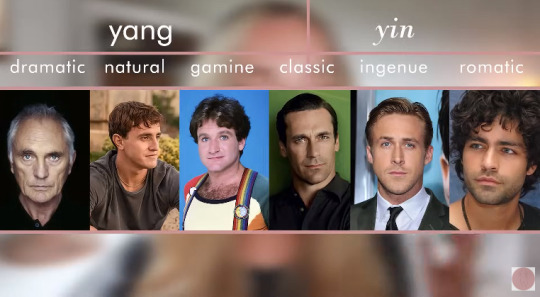
(Credit to: Ellie-Jean Royden)
I'd previously written a post about the Feminine vs. Masculine balance in David Duchovny's face (post here); but found, as I was working on this project, that that method and the Kitchener method overlap each other. Both assess the yin (soft, rounded, curved lines) and yang (sharp, narrow or blunt, chiseled lines) of a person's face; and draw up a general impression others would have of them at a neutral first glance.
These tools may not appeal to everyone; but boy do they work hand and glove in the entertainment industry. Actors can disguise their natural essence in a role by embodying another person; can tone down their masculine vs. feminine balance with hair, makeup, and styling; and can lean into their natural aura for promotion and marketing. Of course, there is some degree of typecasting-- it would be harder (or impossible) for a person with Gamine Essence (smaller facial features with dynamic odds and ends) to pull off an Ethereal Essence (long, sleek, elongated, elegant lines) than it would for an Ethereal to pull off a Dramatic Essence (as Cate Blanchett did for Thor: Ragnarök.) This system also effectually proves Kibbe's warning: one cannot evaluate a person's Kibbe body type by the face alone-- Ingenue Leonardo DiCaprio and Classic (if I recall) Colin Firth are both Romantics, after all. Similarly, 5'2" Kibbe Theatrical Romantic Gillian Anderson and 5'10" Kibbe Dramatic Tilda Swinton share a striking Ethereal Essence.
**Note**: If you don't care to ingest the full post, skip straight to the DAVID DUCHOVNY header for his analysis.
DECODING KITCHENER ESSENCES FOR MEN
As per my first Essence post, I will be including transcripts and screenshots from Ellie-Jean Royden's video on the topic (here). Also, highly recommend Gabriella Arruda, who has a more practical, everyday wear approach to the Essences (as well as excellent videos combining them with the Kibbe Body Types-- my posts on GA's and DD's Kibbe here and here, respectively-- and seasonal color analysis.)
Dramatic

The Most Yang Dominant (strong features)-- sharp, narrow, long, hard. Defined by: danger, wildness, boldness, theatrical, dark, extravagant, intense, dignified. Dramatic faces tend to have three or more elongated and “hard” traits: high and dominant cheekbones, long faces, sharp jawlines, sharp noses, slightly narrow eyes, narrow lips.

Dramatics look best in sharp, tailored clothes; in bold, extravagant, theatrical styles; …in unconventional or unusual patterns; in asymmetry or straight lines; …in unusual textures or dangerous styles (leather, for example.)
Natural
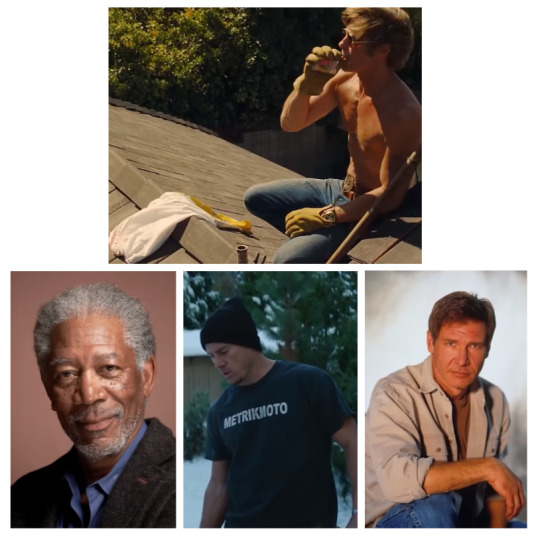
Yang Dominant (strong features)-- blunt, wide, broad, and elongated…instead of elongated, sharp, harsh (you might see men with Dramatic Essence as the villain in a movie… Natural Essence tends to be… the hero of the film.) Defined by: relaxed, earthy, sporty, active, wild, easygoing, approachable, rugged (...chopping a tree down or hacking a block of wood ready for a fire.)

They look best in simple, comfortable, relaxed clothes. They tend to look formal in the most casual and simple styles; whereas… in a suit, they tend to look quite constrained…. Jeans and a t-shirt… don’t look casual or sloppy… looks like it belongs…. Look good in loose fitting; sturdy, oversized sort of styles. Anything with unstructured shapes, layering, or denim.
Gamine

Yang Dominant (strong features)-- sharp or angular features, with some youthful elements (large and soft eyes, or slightly wide and soft noses, or slightly rounded cheekbones with a sharp jaw and narrow eyes.) Defined by: quirky, rebellious, whimsical, youthful (but not as youthful as Ingenue Essence), boyish, playful, fun. Like a Dramatic in some ways… with a youthful undercurrent to them.

They look really good when poking fun at fashion. They look good in mix-n-match or retro styles. They look good in bold colors or unusual patterns. High contrast; quite cool in rolled up jeans or “teenager” hoodies. They look good in lots of detail and compact styles and maybe some whimsical elements.
Classic

Neither Yang nor Yin Dominant (symmetrically balanced features)-- in the middle, not particularly sharp or soft; timeless, neutral features (no defining characteristic features.) Defined by: clean, timeless, elegant, sophisticated, formal, conservative.
They look best in minimal details, allowing their own beauty to shine through. They look good in smooth and controlled lines. They become more memorable as everything else is "stripped" away. They look good in timeless looks-- it doesn't look boring or outdated; tends to look very elegant and chic. You could even describe them as looking regal... in these styles. They look good in symmetry, balance, neutral colors, and quality fabrics.
Romantic

Yin Dominant (soft features)-- soft, round facial features; smouldering eyes; lush lips; slightly narrow jaws; round cheeks or slightly wide noses; often have dark hair and high contrast (like Dramatics, except with shorter, softer lines.) Defined by: sensual, alluring, lush, romantic.

They look good in soft, lush fabrics (like velvet.) Look best in bowties over long ties. They might look good in something a little undone, looser fabrics, softer fabrics. In red or lush colors. In large, rounded patterns. Jewels or jewel tones.
Ingenue
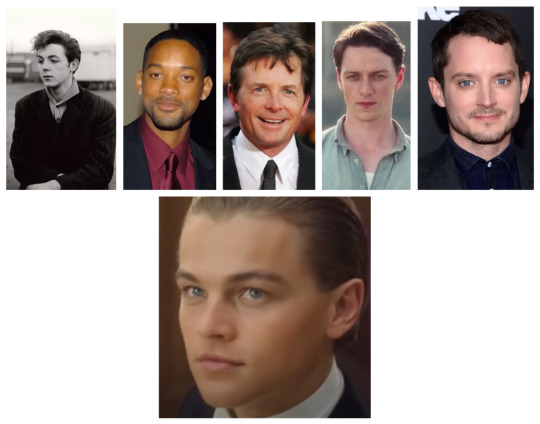
Yin Dominant (soft features)-- baby-like faces (lots of Hollywood male heartthrobs are Ingenues, ex. Leo DiCaprio); small, slightly wide noses; rounder eyes; round cheekbones; plump but smallish lips; rounded and shorter faces. Defined by: sweet looking, innocent, gentle, delicate, adorable, youthful (less “boudoir” than Romantics in the same styles.)

They look best in delicate and small details. Whimsical styles; in anything vintage; in pastel or pale colors; in decorative styles like small floral prints or things that hark back to another era. They look really good in ornate, intricate sort of things. And of course, with soft, delicate fabrics. These men look much better in a bow tie than in a long tie because this mimics their short, rounded facial features.
Ethereal

The Most Yin Dominant (soft features)-- a meeting between yin and yang features. They have elongated faces; some sharp facial features like cheekbones or high foreheads, but with rounded or slightly wide set eyes or soft lips. (Not blending their yin and yang together like Classic, or contrasting it like Gamines.) Defined by: pure, wise, timeless, otherworldly, ageless, old souls, uncanny, celestial (tend to be cast in fantasy roles.)

They look really good in metallics; soft, lightweight, fluttery fabrics; vintage or period pieces with… fantastical, ornate, intricate elements. Too many overdone details tips into caricature; instead, they could opt for gray instead of black, or create a long visual line down with their hair.
DAVID DUCHOVNY
Let's start from the top: discovering what are David's worst essences.
What David Isn't
Dramatic
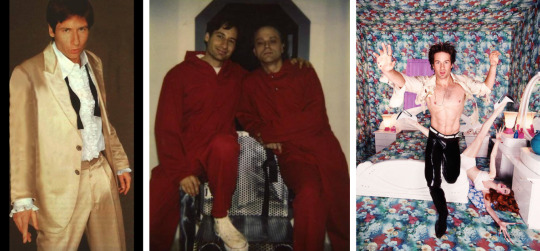
Dramatic is the worst Essence for DD, turning his flare for the "out there" into costume and caricature, wearing him instead of the other way 'round. As such, he often hams up his poses or expressions to better match the energy of the shot, transforming it from avant-garde fashion to tongue-in-cheek performance art.
Gamine

David is drawn to pizzazz, to bold colors, to unique styles. There's a part of his nature that responds to it-- which is easy to see why, when we explore his primary Essence. However: he walks right by the most flattering option to snatch up the second worst.
He's a handsome man, no doubt... but even his looks can't save him from the consequences of his dilapidated fashion sense. Youthful vibes very well with David; but he jumps upon an "aha!" too vigorously, overdoing it with more and more funky, punky, spiky, mismatchy elements. Not even his Kibbe can save him: if he'd been Romantic or Gamine instead of Soft Natural, his shorter bones might have been able to more effectively cover up the disjointed effect.
The bottom rows can be salvageable, as his hairstyle would be dependent on what outfit he wore with it. But even at face value, there's something off about too much tousle either way. The bland-for-him Classic Essence shirt in the last picture doesn't help matters.
Classic

Classic is not the worst on David; but it's not the best, either.
Minimal detail on David tends to wash out his unique charm, burying it under too much finish or polish. The suit in the first picture appears to have been purposefully bought a size up in an attempt to "soften" the silhouette on DD (without success); and the second is too pinched and narrow in the shoulders and too widening and tailored at the hips (a typical Classic silhouette composed of equal parts yin and yang.) The two gray shirts, however, are better: they fit the lines of his body (Kibbe), are Medium Value gray (an aspect of his seasonal color analysis), and are better accessorized with tiny details (buttons and pockets.) Steps in the right direction, but not a complete victory.
Romantic

David's styling and poses are overtly sexual here; but the result is more akin to off-the-clock lounging than reach-into-your-heart-through-your-eyes-and-consume-your-soul sensuality. Put more concisely, his sexy isn't boudoir or bodice ripper.
The top pose is the most off-kilter; but the second row's pictures are all salvageable. David's neutral expression in the first pic changes the effect into steamy relaxation; his pose and delicate elements in the second turns the shot into something fresh and almost soulful; and his luxuriously soft hair and pajamas in the third reads as one clean, complete look. The last two particularly are mixed with his primary and secondary Essences.
What David Is
Natural

Maybe. Not discounting the possibility.
It wouldn't be a surprise: David is a Kibbe Soft Natural; and there is definite overlap between its lines and Kitchener's Essence. However: David can only handle teeny tiny amounts of it. Too much and he looks like a clean-shaven homeless man wearing the wealthy neighborhood's overpriced hand-me-downs instead of his old, gunky, raggedy hoodie. That, or a struggling artist.
The top left look is salvageable: his glasses are a complimentarily small detail, his sleeves are rolled up above the wrists, his hair isn't too wild or unkempt, and his pants aren't visible in the shot. Not the best, but definitely not the worst.
Ethereal
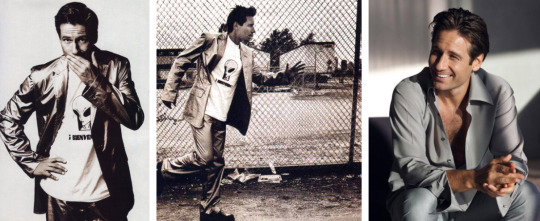
The gray shirt's back! That's because, despite the intent of the shot, the end result is an Ethereal Essence come to life: long, luxurious, draping silhouette; lower contrast grey instead of a harsher, richer color like black; and shadowy, "otherworldly" set dressing.
David's first two looks are from the same photoshoot. The metallic sheen in his suit and Ethereal graphic on his shirt turn this look from a classic silhouette into a statement piece, one that perfectly accords with David's blink-and-you'll-miss-it expression and understated-overstated drama.
However: it's not his best Essence: lines that are too flowy or too long or too "flyaway" jar slightly with his persona-- not quite messy, but not quite right.
Ingenue

David's best Essence is Ingenue-- and no wonder. Even early on his career, fans were calling him a puppy and wanting to take care of him.
His sensuality is expressed by irrepressible innocence, that element of childishness he misinterprets as Gamine's boyishly spunky, eternally youthful spark. With that in mind, he should focus on softer details instead-- not replacing his funky inclinations so much as tempering them. Funk on a smaller, scale: delicate ornateness instead of jagged edges and opposing prints; repeatable patterns instead of differing styles mashed together. David should also lean into buttons, comfy textured fabrics, and bowties to match the tiny, repeated curves in his face.
COMPARING OTHER SOFT NATURAL ESSENCES
Let's test out his Ingenue Essence.
How shall we do that? By comparing him to other men that share his same Kibbe Soft Natural body type.
Dramatic Essence: None
I don't have a Dramatic SN to compare; but i think we can all conclude that this Essence doesn't scream 'David Duchovny.'
Natural Essence: Brad Pitt and Robert Redford

Brad and Robert are put together and at ease in differing levels of "dishevelment." David, though more "himself", does not (even with the same level of tailoring and styling care in the first photo as Brad.)
Gamine Essence: Gene Kelly

Gene comes alive in bold, expressive, potentially clashing elements. David, however, looks mismatched and uncomfortable.
Classic Essence: John Wayne

While John shines with minimal detail, David becomes flat.
Romantic Essence: George Clooney
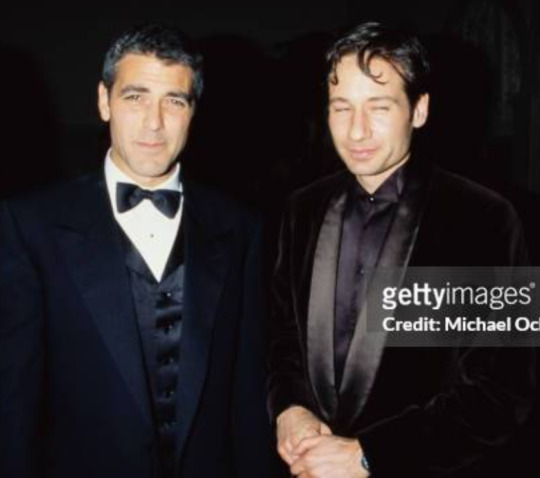
Here we can see George's effortless romanticism and David's endearing Ingenue charm radiating from their pores.
Ingenue Essence: Bing Crosby
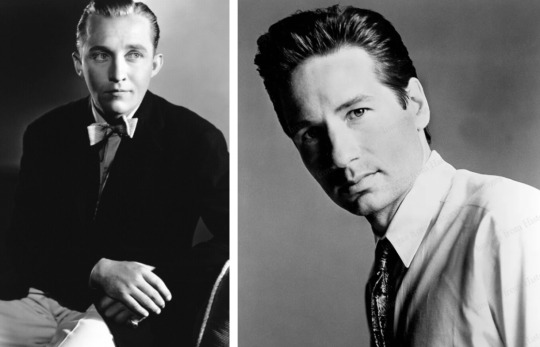
With both of their hair slicked up and back, it's too easy to spot the shared tiny, delicate aspects dominating Bing's and David's face. Bing's bowtie and David's small-scale tie further accentuate these features, as do their softer profiles and lower contrast.
Ethereal Essence: None
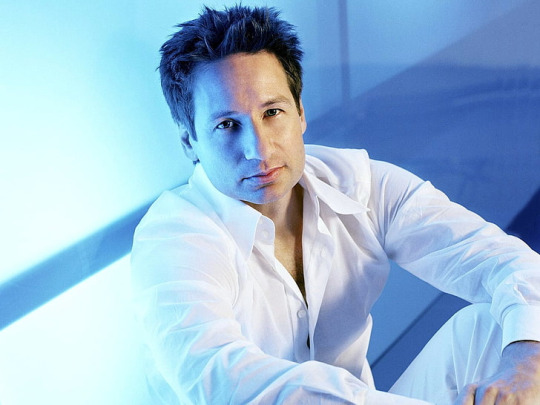
Again, I was unable to find a Kibbe approved Soft Natural that fit the Ethereal requirements. However, I did find DD in an Ethereal shirt and studio set; so, let us gaze upon it, note it works but not fully, and move along.
COMPARING TWO INGENUE ESSENCES

To further prove the Ingenue theory, we can compare him against Kibbe Romantic Elijah Wood's Ingenue Essence. Both have smaller scale facial features, softer lines, and softer silhouettes. They are also complimented very naturally by smaller scale accessories, smaller scale repeating patterns, smaller scale soft tailoring, and smaller scale bowties (compared to their regular ones.) These touches tap into and bring out their "cute" undercurrent easily and effectively.
ALL TOGETHER

CONCLUSION
Ingenue-Ethereal, perhaps Ingenue-Ethereal-Natural. Not bad!
It makes sense why he and Gillian sold The X-Files: the softened bluntness of his Kibbe created a striking visual contrast against her narrow, sharp Kibbe while their close percentages of Ethereal Essence knit those differences back together in an otherworldly, mythical pursuit of the truth (be it men, monsters, or insane work hours.)
Meanwhile, David is drawn to characteristic detail, unfortunately expressing that dynamic essence through Gamine rather than its perfect twin Ingenue. Furthermore, his love of long, less-restrictive lines is also misplaced in the Natural Essence, whereas it would be right at home in the equally less restrictive but also softer and sleeker Ethereal Essence.
Thanks for reading~
Enjoy!
34 notes
·
View notes
Text
You know, I think some people think of discernment as some kind of special skill or talent that correlates with good mental health, when in reality it's a form of examination that everybody already does.
If you smelled a carton of milk to check if it was bad, you've used discernment.
If you sat there and deliberated between the price points of two different identical products, you've used discernment.
If someone has ever told you a bit of news, and you've gone and checked the news to see if they were telling the truth, you've used discernment.
Developing greater discernment lies and simply developing different methods to differentiate what something is from what we think it is, and from what it isn't.
For example: Let's talk about discerning thoughts from emotions. I did a poll a while back about this, and this was the area that people seem to struggle with the most out of the choices.
If we are not sure how to tell the difference between thoughts and emotions within ourself, we can start by first investigating what they individually are. This may even involve going and looking at the individual definitions and drawing a comparison. But for the sake of illustrating this analogy, here is what they are in their most simplest terms:
A thought is a mental construct.
An emotion is a mood.
They're interrelated, of course, because the body operates as an ecosystem: Thoughts can influence emotions and emotions can influence thoughts. One may even argue that emotions are a kind of thinking. Both of them are used for self-expression.
We've established what these two things are, but to disambiguate further we actually have to look at what thoughts and emotions do. As in, what their functions are:
The function of a thought is to assist in understanding and decision-making.
The function of an emotion is assist in physiological understanding and to regulate homeostasis.
There's also the fact thoughts feel different than emotions as an experience, as in, they feel different in the body. This can be discerned simply by noticing them and observing how they feel different.
This is the kind of thing that I actually want to try to find or build a methodology around at some point, because as much as I can give the specific methods, it's the kind of thing where following the instructions doesn't always beget an intuitive understanding of how it works.
47 notes
·
View notes